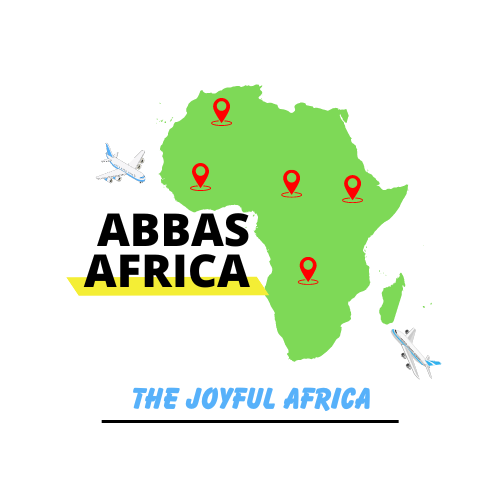
Abbas Africa
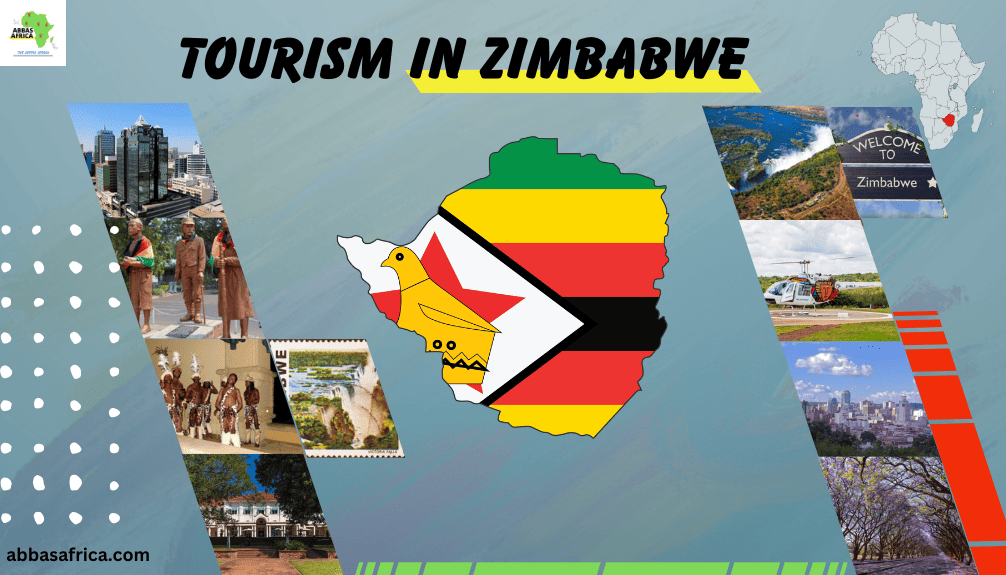

Tourism in Zimbabwe: Overview
As I stand before the majestic Victoria Falls, I am reminded of the sheer power and beauty that Zimbabwe has to offer. The tourism industry in this country is like a hidden gem waiting to be discovered, with its untapped potential and unique experiences.
But what exactly is the current state of tourism in Zimbabwe? How many visitors does it receive annually and how much revenue does it generate? Join me as we unravel the secrets of this prime tourism destination, explore its key sites and attractions, and uncover the role of technology in shaping Zimbabwean tourism.
Get ready to immerse yourself in the vibrant music, art, and culinary scene that enhances the overall tourism experience. Together, let’s journey through the history, prospects, and trends of tourism in Zimbabwe.
Key Takeaways
- Zimbabwe’s tourism industry has experienced significant growth in revenue, visitor numbers, and popularity, making it one of the most sought-after destinations in Africa.
- The number of visitors to Zimbabwe annually is an important indicator of the country’s appeal and the impact of tourism on its economy. It also helps in effectively planning and managing tourism resources.
- Zimbabwe attracts a diverse range of tourists, including wildlife enthusiasts, adventure seekers, and cultural explorers, due to its abundant national parks, thrilling activities, and rich cultural heritage.
- Tourism in Zimbabwe generates a substantial amount of revenue, contributing significantly to the country’s overall income. This revenue supports infrastructure development, job creation, and conservation efforts.
What Is the Current State of Tourism in Zimbabwe?
Zimbabwe’s tourism industry is currently facing both obstacles and opportunities for development. Despite the ongoing impact of COVID-19, the sector managed to generate approximately $397 million in 2021, showing growth compared to the previous year’s $360 million. However, according to the Zimbabwe Tourism Authority, the number of tourist arrivals dropped significantly from 639,369 in 2020 to 380,820 in 2021, largely due to the pandemic’s effects. The majority of visitors came from Africa and the Middle East, while other regions like the Americas, Oceania, Europe, and Asia experienced declines in tourist numbers. Although slightly lower than the Zimbabwe Tourism Authority’s report, WorldData recorded a total of 639,000 tourists in Zimbabwe in 2020, ranking the country 87th globally. The travel and tourism sector contributed around 4% to Zimbabwe’s GDP in 2021, according to Statista. Looking ahead, the Travel & Tourism market in Zimbabwe is projected to reach a revenue of $173.40 million by 2024, with an anticipated growth rate of 5.62% from 2024 to 2028. This indicates the resilience of Zimbabwe’s tourism industry and its potential for future expansion, it is currently ranked as the country’s third-largest sector, following mining and agriculture. It can make a substantial contribution to Zimbabwe’s economic revival.
How Many Visitors Does Zimbabwe Receive Annually?
As I explored the topic of tourism in Zimbabwe, I found some interesting numbers regarding the annual visitors. In 2022, tourist arrivals in Zimbabwe increased to 1,043,781 from 380,820 in 2021. The highest number of tourist arrivals was recorded in 2018 at 2,579,974, while the lowest was in 1980 at 237,668 according to Zimbabwe Tourism Authority. There was a significant drop in tourist arrivals from 2019 to 2020, with numbers falling from 2,294,259 to 639,356 due to the impact of COVID-19. Despite the challenges faced during the pandemic, Zimbabwe’s tourism industry is bouncing back, with an average of 1,642,477.60 tourist arrivals since 1980. This highlights the country’s potential for growth and reinforces its position as a desirable and exciting place for travelers to explore.
Who Are the Major Tourists in Zimbabwe?
The majority of tourists in Zimbabwe are Africans. In 2018, the majority of tourists visiting Zimbabwe were from African countries, with a total of 2,064,534 visitors. There were also 515,440 non-African tourists that year. In 2019, there were 1,872,565 African tourists and 421,603 tourists from overseas according to Zimbabwe Tourism Authority. By 2021, the number of African tourists decreased to 269,364 due to the COVID-19 pandemic, while the Americas became the second leading region of origin for international tourists, with approximately 21,000 visitors. In 2022, there was an increase in both African and overseas tourists, with 693,281 and 350,500 visitors respectively.
How Much Revenue Does Tourism Generate for Zimbabwe?
In 2021, the tourism sector in Zimbabwe experienced growth, generating $397 million in revenue compared to $360 million in the previous year. This growth is a positive sign despite challenges such as the impact of COVID-19, political instability, and economic uncertainty. According to Statista, travel and tourism contributed approximately 4% to Zimbabwe’s GDP in 2021.
Despite the obstacles faced, Zimbabwe’s tourism receipts have shown an upward trend, with a 24 percent increase to $272.26 million in the period leading up to September 2023. The Zimbabwe Tourism Authority projects that the tourism sector will continue to grow, reaching a revenue of $173.40 million by 2024. This growth is expected to continue at a rate of 5.62% from 2024 to 2028.
In terms of domestic and international spending, the total expenditure in the travel sector decreased from nearly one billion U.S. dollars in 2019 to 880 million U.S. dollars in 2021, as reported by Statista. Despite this decrease, the tourism sector still plays a significant role in Zimbabwe’s economy, accounting for 2.5 percent of total employment in the country in 2021, which amounts to 165,000 jobs. This indicates that tourism provides employment opportunities for locals and contributes to overall economic growth.
To further support the growth of the tourism economy, the Zimbabwean government has set a target to reach $5 billion by 2025. This demonstrates their commitment to developing and expanding the tourism sector in the country.
What Makes Zimbabwe a Prime Tourism Destination?
Zimbabwe is a prime tourism destination for several reasons.
Firstly, its rich cultural heritage is a major draw for tourists. From ancient ruins like Great Zimbabwe to vibrant festivals and traditional crafts, there’s so much to explore and learn about the country’s history and traditions.
Secondly, Zimbabwe boasts breathtaking natural wonders such as Victoria Falls, Hwange National Park, and the Great Zimbabwe National Monument, offering endless opportunities for wildlife encounters and awe-inspiring landscapes.
How Does Zimbabwe’s Rich Cultural Heritage Contribute to Its Appeal as a Tourist Destination?
As a prime tourism destination, Zimbabwe offers a rich cultural heritage that captivates visitors from around the world. From the vibrant and lively traditional music and dance performances to the fascinating historical sites that tell the story of the country’s past, tourists can encounter unique cultural experiences at every turn.
Immerse yourself in the local customs and traditions, sample the delicious local cuisine, and interact with the friendly and welcoming locals to truly appreciate the beauty and diversity of Zimbabwe’s cultural heritage.
What Are Some Unique Cultural Experiences That Tourists Can Encounter in Zimbabwe?
Zimbabwe offers a range of unique cultural experiences for tourists, including: Traditional village tours: Visitors can experience the traditional way of life in Zimbabwe by taking a village tour in Victoria Falls.
Cultural festivals: Zimbabwe hosts vibrant cultural festivals such as the Harare International Festival of the Arts, which provide opportunities for visitors to immerse themselves in traditional music, dance, and other art forms.
Heritage sites: Zimbabwe showcases its rich cultural heritage through UNESCO World Heritage Sites such as the Great Khami Ruins and Matobo Hills.
Traditional ceremonies: Visitors can witness traditional ceremonies and fascinating religious idols and sculptures, crafts work, folklore, and modern theater.
Wildlife viewing: Zimbabwe offers opportunities for wildlife viewing, including the Big Five, and eco-tourism experiences.
Authentic experiences: Zimbabwe emphasizes the authenticity of traditions and local communities, and promotes community-based tourism initiatives that allow visitors to engage with the local culture. These unique cultural experiences form the basis on which tourists can position Zimbabwe as a natural beauty, adventure, and sustainable tourism destination.
What Are the Must-See Natural Wonders in Zimbabwe?
When it comes to natural wonders, Zimbabwe is a treasure trove waiting to be explored. From majestic waterfalls to vast national parks, this country has it all.
Here are four must-see natural wonders that make Zimbabwe a prime tourism destination: The iconic Victoria Falls, one of the world’s largest waterfalls, is known as the ‘Smoke that Thunders.’
Hwange National Park is home to a diverse range of wildlife including elephants, lions, and giraffes.
Mana Pools National Park, a UNESCO World Heritage Site, offers breathtaking views of the Zambezi River and abundant wildlife.
Lake Kariba, the world’s largest man-made lake, is perfect for fishing, boating, and wildlife spotting.
How Does Zimbabwe’s Diverse Landscapes and Natural Wonders Attract Tourists?
Zimbabwe’s diverse landscapes and natural wonders captivate tourists, making it a prime destination for those seeking awe-inspiring beauty and adventure.
The country boasts magnificent national parks, such as Hwange and Mana Pools, where visitors can witness an abundance of wildlife in their natural habitats.
The iconic Victoria Falls, one of the world’s largest waterfalls, is a must-see attraction that leaves visitors spellbound.
The stunning landscapes, including the breathtaking Matobo Hills and the picturesque Eastern Highlands, offer endless opportunities for exploration and connection with nature.
Zimbabwe truly offers a captivating and unforgettable experience for every nature lover.
What Are the Key Sites and Destinations/Attractions in Zimbabwe?
When it comes to key sites and attractions in Zimbabwe, there’s no shortage of breathtaking options.
From the UNESCO World Heritage Sites like the majestic Victoria Falls and the ancient ruins of Great Zimbabwe to the vast national parks teeming with wildlife such as Hwange and Mana Pools, there’s something for everyone.
And let’s not forget the stunning beaches along Lake Kariba, perfect for unwinding and enjoying the serene beauty of Zimbabwe.
Lastly, for those interested in history and culture, the museums scattered throughout the country provide an enriching experience that showcases Zimbabwe’s rich heritage.
UNESCO World Heritage Sites in Zimbabwe
One of the most captivating aspects of Zimbabwe is its collection of UNESCO World Heritage Sites, which offer a glimpse into the country’s rich history and breathtaking natural beauty. These sites are a testament to Zimbabwe’s cultural and natural significance on a global scale.
Here are some of the key UNESCO World Heritage Sites in Zimbabwe:
- Great Zimbabwe : This ancient city is an architectural marvel, showcasing the impressive stone structures of the Shona civilization.
- Mana Pools National Park : Located along the Zambezi River, this park is a haven for wildlife, including elephants, lions, and hippos.
- Matobo Hills : Known for its stunning granite rock formations, this area isn’t only a place of natural beauty but also holds great spiritual and cultural significance for the local people.
- Victoria Falls : One of the Seven Natural Wonders of the World, this majestic waterfall is a sight to behold, attracting visitors from all over the globe.
Visiting these UNESCO World Heritage Sites allows you to immerse yourself in Zimbabwe’s rich heritage and experience its awe-inspiring natural wonders.
National Parks in Zimbabwe
With its diverse and stunning landscapes, Zimbabwe boasts an array of national parks that offer unparalleled opportunities for wildlife encounters and outdoor adventures. Whether you’re a nature enthusiast or simply looking to immerse yourself in the beauty of the African wilderness, these national parks are a must-visit destination.
Here are four key sites and attractions that should be on your itinerary:
- Hwange National Park : Known for its vast elephant population, Hwange National Park is the largest game reserve in Zimbabwe. Explore its vast plains and witness a diverse range of wildlife, including lions, giraffes, and antelopes.
- Mana Pools National Park : Situated on the banks of the mighty Zambezi River, Mana Pools National Park offers a unique safari experience. Witness elephants bathing in the river, spot hippos and crocodiles, and embark on thrilling canoe safaris.
- Matobo National Park : Famous for its ancient rock formations and rich cultural history, Matobo National Park is a UNESCO World Heritage Site. Discover ancient rock art, go rhino tracking, and enjoy breathtaking views from the top of the granite hills.
- Gonarezhou National Park : Located in the southeastern part of the country, Gonarezhou National Park is a hidden gem. Explore its rugged landscapes, spot the elusive African wild dogs, and take a dip in the stunning Chilojo Cliffs.
In Zimbabwe’s national parks, you’ll find a sense of belonging as you connect with nature and witness the incredible wildlife that calls these parks home.
Beaches in Zimbabwe
As I continue exploring the diverse and captivating landscapes of Zimbabwe, I’m drawn to the allure of its pristine beaches, which offer a refreshing contrast to the country’s renowned national parks. Here are some of the key sites and attractions that make Zimbabwe’s beaches truly special:
- Victoria Falls : Not only famous for its magnificent waterfall, Victoria Falls also boasts a stunning riverfront with sandy beaches where visitors can relax and take in the breathtaking views.
- Lake Kariba : This massive lake, formed by the Kariba Dam, stretches along Zimbabwe’s northern border, offering picturesque beaches and ample opportunities for fishing, boating, and wildlife viewing.
- Eastern Highlands : Nestled in Zimbabwe’s eastern region, the Eastern Highlands are adorned with crystal-clear rivers and beautiful waterfalls, creating idyllic spots for picnics and leisurely walks along the riverbanks.
- Mozambique Border : Zimbabwe shares a border with Mozambique, where pristine beaches await. From the coastal town of Beira to the tropical paradise of Bazaruto Island, these beaches offer a slice of paradise for sun-seekers and water sports enthusiasts alike.
With these stunning beach destinations, Zimbabwe truly offers something for everyone, inviting you to experience the beauty and serenity of its coastal treasures.
Museums in Zimbabwe
Zimbabwe’s rich history and cultural heritage come to life through its impressive array of museums, showcasing the country’s key sites, destinations, and attractions. These museums offer a glimpse into the fascinating past of Zimbabwe, captivating visitors with their informative exhibits and interactive displays.
Here are some must-visit museums in Zimbabwe:
- National Museum of Zimbabwe : Explore the country’s history, archaeology, and art through its extensive collection of artifacts and artworks.
- Great Zimbabwe Museum : Delve into the ancient civilization of Great Zimbabwe, with its iconic stone ruins and rich cultural significance.
- Bulawayo Railway Museum : Step back in time and discover the history of railways in Zimbabwe, with vintage locomotives and carriages on display.
- Zimbabwe Museum of Human Sciences : Learn about the diverse culture and traditions of Zimbabwe’s people, from ancient times to the present day.
These museums offer a unique and immersive experience, allowing visitors to connect with the heritage and stories of Zimbabwe, fostering a sense of belonging and appreciation for the country’s rich past.
What Are the Key Trends that Are Propelling the Growth of Tourism in Zimbabwe?
- Safari adventures that offer up-close encounters with the country’s diverse wildlife.
- Cultural tourism experiences that allow visitors to immerse themselves in Zimbabwe’s rich heritage and traditions.
- The development of luxury resorts and eco-lodges that provide a unique and sustainable way to experience the country.
- The promotion of adventure tourism activities, such as white-water rafting, bungee jumping, and hiking in the stunning landscapes of Zimbabwe.
These key trends are driving the growth of tourism in Zimbabwe by catering to the desires of travelers who seek authentic experiences, connection with nature, and a sense of adventure. With its abundant wildlife, vibrant culture, and breathtaking scenery, Zimbabwe offers a wealth of opportunities for tourists to explore, learn, and create lasting memories.
Whether it’s embarking on a thrilling safari, engaging with local communities, or indulging in luxury accommodations, Zimbabwe has something for everyone. So, pack your bags and get ready to discover the wonders of this beautiful country.
How Does Zimbabwe Contribute to Tourism in Africa?
Zimbabwe contributes to tourism in Africa through its diverse attractions such as Victoria Falls, one of the largest waterfalls in the world, and its abundant wildlife in national parks like Hwange and Mana Pools. The country offers unique experiences like safari tours, cultural encounters, and adventure activities like white-water rafting. Zimbabwe’s welcoming people, rich history, and vibrant culture also play a significant role in attracting visitors to explore this beautiful African destination.
What Is the Overall Importance of Tourism for Zimbabwe?
The growth of tourism in Zimbabwe not only brings about exciting safari adventures and cultural experiences but also plays a vital role in the country’s overall development. Here are some key reasons why tourism is important for Zimbabwe:
- Economic Impact : Tourism is Zimbabwe’s third-largest sector after mining and agriculture, contributing significantly to the country’s GDP (4% in 2021), it contributes to the country’s economy by generating revenue, creating job opportunities, and boosting foreign exchange earnings.
- Infrastructure Development : The tourism industry drives the development of infrastructure such as transportation networks, accommodation facilities, and tourist attractions, which benefits both tourists and locals.
- Community Development and Cultural Preservation : Tourism provides opportunities for local communities to engage in sustainable livelihoods, preserves cultural heritage, and encourages the conservation of natural resources.
- Global Image and Brand : A thriving tourism sector enhances Zimbabwe’s international reputation, attracting more tourists and investment, and promoting a positive image of the country.
What Are the Key Potential Benefits of Tourism for Zimbabwe?
Tourism in Zimbabwe holds immense potential to unlock a world of benefits and opportunities for the country and its people. Here are the key potential benefits that tourism can bring to Zimbabwe:
- Economic growth : Tourism has the power to stimulate the economy by creating jobs, generating revenue, and attracting foreign investment.
- Cultural preservation : Tourism can help preserve Zimbabwe’s rich cultural heritage by encouraging the protection and promotion of traditional arts, crafts, and customs.
- Infrastructure development : The development of tourism infrastructure, such as hotels, roads, and airports, can benefit not only tourists but also the local community.
- Global recognition : By attracting tourists from around the world, Zimbabwe can enhance its global image and reputation, showcasing its natural beauty, wildlife, and unique experiences.
With the right planning and investment, tourism can play a vital role in the sustainable development of Zimbabwe, benefiting both the country and its people.
What Are the Key Challenges Facing Zimbabwe’s Tourism?
Facing numerous challenges, Zimbabwe’s tourism industry must navigate a complex landscape to realize its full potential. As a thriving industry that contributes significantly to the country’s economy, it faces several key challenges:
- Political instability and security concerns that deter tourists from visiting.
- Limited infrastructure, including inadequate road networks and unreliable power supply, hindering accessibility and comfort for tourists.
- Poor marketing and branding efforts that fail to effectively promote Zimbabwe as a desirable tourism destination.
- Conservation issues, such as poaching and unsustainable practices, threaten the country’s wildlife and natural attractions.
Despite these challenges, Zimbabwe’s tourism industry has immense potential. By addressing these issues and implementing strategic measures, the country can attract more tourists, boost its economy, and showcase its rich cultural heritage and breathtaking landscapes to the world.
What Are the Untapped Potentials in Zimbabwe’s Tourism Sector?
As Zimbabwe’s tourism industry works towards overcoming its key challenges, there lies a wealth of untapped potential waiting to be explored and capitalized on. Here are some of the untapped potentials in Zimbabwe’s tourism sector:
- Rich cultural heritage : Zimbabwe is home to diverse ethnic groups, each with its unique traditions, music, dance, and cuisine. Exploring and promoting this cultural heritage can attract tourists looking for an authentic experience.
- Wildlife conservation : Zimbabwe boasts an abundance of wildlife, including the Big Five. By investing in sustainable wildlife conservation efforts and promoting responsible tourism, the country can attract nature enthusiasts and eco-conscious travelers.
- Adventure tourism : With its stunning landscapes, Zimbabwe offers a wide range of adventure activities such as hiking, white-water rafting, and zip-lining. Developing and promoting adventure tourism can attract thrill-seekers and adrenaline junkies.
- Historical sites : Zimbabwe has a rich history, including ancient ruins such as the Great Zimbabwe and Khami. Preserving and promoting these historical sites can attract history buffs and archaeology enthusiasts.
How Does Tourism Contribute to the Economic Growth and Development of Zimbabwe?
As someone who’s witnessed the tourism development in Zimbabwe firsthand, I can confidently say that it plays a crucial role in the economic growth and development of the country.
Tourism contributes significantly to the economic growth and development of Zimbabwe in several ways:
Contribution to GDP: Zimbabwe’s tourism sector contributed 4% of the country’s GDP in 2021, generating $397 million, making it one of the fastest-growing industries.
Employment Opportunities: The tourism industry’s expansion has generated employment in the hospitality, transportation, and retail sectors. In 2021, 165,000 jobs were created, accounting for 2.5% of the country’s total employment.
Infrastructure Development: The development of tourism infrastructure, including hotels, lodges, and other tourism facilities, has contributed to the overall economic growth of the country.
Foreign Exchange Earnings: Tourism is a significant source of foreign exchange earnings for Zimbabwe, helping to relieve the foreign exchange constraint and promote economic growth.
Community Development: Tourism has the potential to uplift local communities by providing employment opportunities, promoting local businesses, and fostering cultural exchange.
Cultural Preservation: Tourism helps preserve and promote Zimbabwe’s rich cultural heritage, including traditional customs, music, dance, and unique art forms.
Global Image and Brand: Zimbabwe’s diverse natural attractions, such as national parks, Victoria Falls, and the Great Zimbabwe National Monument, have the potential to attract tourists and enhance the country’s global image and brand.
These factors collectively demonstrate the significant contribution of tourism to the economic growth and development of Zimbabwe, making it a vital sector for the country’s future prosperity.
How Is the Tourism Development Going In Zimbabwe?
Tourism in Zimbabwe plays a pivotal role in driving economic growth and development, as it contributes significantly to the country’s revenue and employment opportunities (165 thousand jobs in 2021).
In recent years, Zimbabwe has experienced a positive trend in tourism development. The government has implemented various strategies to attract more tourists, such as improving infrastructure, promoting cultural heritage, and ensuring safety and security for visitors. As a result, the number of international tourists has been steadily increasing, with 1,043,781 visitors in 2022 from 380,820 in 2021.
The Zimbabwean government has taken steps to promote investment in the tourism industry through initiatives such as tax incentives and other supportive measures. Furthermore, the International Finance Corporation (IFC) is actively involved in assisting Zimbabwe in enhancing the economic impact of tourism, attracting private sector investment in targeted areas, and fostering a more conducive business environment. The tourism industry in Zimbabwe is gradually recovering and growing, offering unique experiences and opportunities for both visitors and locals alike.
What Are the Cultural and Environmental Impacts of Tourism in Zimbabwe?
With each passing year, Zimbabwe’s vibrant culture and breathtaking environment are both shaped and influenced by the steady influx of tourists.
The cultural impact of tourism in Zimbabwe is evident in the interactions between locals and visitors. As tourists immerse themselves in the local customs and traditions, they gain a deeper understanding and appreciation for the rich cultural heritage of Zimbabwe. This exchange of ideas and experiences fosters a sense of belonging and unity among different communities.
Furthermore, the environmental impact of tourism in Zimbabwe is significant. The country’s stunning natural landscapes, such as Victoria Falls and Hwange National Park, attract tourists from around the world. However, it’s crucial to ensure sustainable practices to protect these fragile ecosystems and preserve them for future generations. Efforts are being made to promote responsible tourism and conservation initiatives to minimize any negative impacts on Zimbabwe’s environment.
What Are the Main Types of Tourism in Zimbabwe?
Several types of tourism in Zimbabwe await travelers, including: Wildlife Tourism: Zimbabwe is home to a diverse range of wildlife, including the Big Five, and offers opportunities for wildlife viewing and eco-tourism experiences.
Cultural Tourism: Zimbabwe’s rich cultural heritage, including traditional customs, music, dance, and unique art forms, attracts visitors interested in cultural experiences.
Business Tourism: Zimbabwe has the potential to attract business travelers, with opportunities to develop conference and convention centers, resorts, and shopping malls.
When it comes to tourism in Zimbabwe, one of the main types that stands out is safari tours. These thrilling adventures allow visitors to explore the country’s diverse and stunning wildlife in their natural habitats.
From the majestic elephants roaming freely in Hwange National Park to the breathtaking Victoria Falls, Zimbabwe offers an array of safari experiences that cater to all interests and budgets.
How Popular Are Safari Tours in Zimbabwe?
When it comes to safari tours in Zimbabwe, they aren’t just popular, they’re a must-do experience for wildlife enthusiasts like myself.
The country is known for its abundant and diverse wildlife, making it a prime destination for African wildlife tourism.
From spotting majestic elephants and lions to witnessing the breathtaking beauty of Victoria Falls, Zimbabwe offers a range of safari experiences that cater to different interests and budgets.
Whether you choose to explore the famous Hwange National Park or embark on a canoe safari along the Zambezi River, the thrill of encountering these magnificent creatures in their natural habitat is truly unparalleled.
Is African Wildlife Tourism in Zimbabwe Worth the Experience?
Exploring the diverse African wildlife through tourism in Zimbabwe is a captivating and enriching experience that’s well worth the adventure. The country’s breathtaking landscapes and abundance of wildlife make it a prime destination for safari tours.
Witnessing majestic elephants roaming freely, spotting elusive leopards in their natural habitat, and encountering rare bird species are just a few of the incredible encounters you can have.
Zimbabwe’s commitment to conservation ensures that you not only have a thrilling experience but also contribute to the preservation of these magnificent creatures.
What Are the Top Tourist Destinations in Zimbabwe?
Zimbabwe offers several tourist destinations, including national parks, natural attractions, cultural sites, and historical landmarks. Here are some of the top tourist destinations in Zimbabwe: Victoria Falls: One of the most iconic tourist sites in Zimbabwe, Victoria Falls is a UNESCO World Heritage Site and one of the largest waterfalls in the world.
Harare: The capital city of Zimbabwe, Harare offers a range of attractions, including historical sites, museums, and cultural experiences
Hwange National Park: Zimbabwe’s largest national park, Hwange is home to a diverse range of wildlife, including elephants, lions, and giraffes.
Great Zimbabwe National Monument: This ancient city and UNESCO World Heritage Site showcases the rich history and culture of the region.
Lake Kariba: One of the largest man-made lakes in the world, Lake Kariba offers opportunities for fishing, boating, and wildlife viewing.
These are just a few of the many tourist destinations that Zimbabwe has to offer. Visitors can also experience cultural tourism, adventure tourism, and ecotourism in Zimbabwe.
How Safe Is Traveling for Tourists in Zimbabwe?
As a tourist in Zimbabwe, I feel safe and secure exploring its top destinations. The country has made significant improvements in terms of safety and security for travelers. The government has implemented measures to ensure the well-being of tourists, such as increased police presence in popular tourist areas and enhanced security at airports.
Zimbabwe is known for its warm and welcoming people, who prioritize the safety and comfort of visitors. Popular tourist destinations like Victoria Falls, Hwange National Park, and Great Zimbabwe are well-maintained and have dedicated security personnel to ensure a peaceful experience.
It’s always advisable to take common precautions, such as avoiding isolated areas at night and keeping an eye on personal belongings.
What Are the Best Times to Visit Zimbabwean Destinations?
One of the top tourist destinations in Zimbabwe is the magnificent Victoria Falls. Known as the ‘Smoke that Thunders,’ this iconic waterfall is a sight to behold.
But what are the best times to visit Zimbabwe’s other incredible destinations? Let me guide you through the seasons.
If you’re a wildlife enthusiast, the dry season from May to October is perfect for game viewing in Hwange National Park. The animals gather around waterholes, making it easier to spot them. For bird lovers, the wet season from November to March is ideal, as migratory birds flock to the area.
For a cultural experience, visit Zimbabwe during its vibrant festivals like the Harare International Festival of the Arts in May or the Zimbabwe International Film Festival in October.
No matter when you choose to visit, Zimbabwe offers something for everyone. So pack your bags and get ready to embark on an unforgettable adventure in this beautiful country.
Are There Specialized Travel Agencies for Zimbabwe Tourism?
Yes, there are specialized travel agencies for Zimbabwe tourism. Some of the travel agencies and tour operators in Zimbabwe include: Travelo Zimbabwe: A reputed tour operator in Zimbabwe that arranges custom tour packages with an expert local tour guide to explore Zimbabwe tourism.
Intrepid Travel: A tour operator that offers a range of tours and experiences in Zimbabwe, including wildlife safaris, cultural tours, and adventure activities.
DK Tours & Safaris: A tour operator that specializes in wildlife safaris and cultural tours in Zimbabwe.
Contiki: A tour operator that offers a range of tours and experiences for young travelers in Zimbabwe, including adventure activities and cultural tours.
Off2Africa Travel: A Zimbabwe-based tour operator that offers African safari tours and has been in business for over 15 years.
These travel agencies and tour operators offer a range of services and experiences for tourists visiting Zimbabwe, including wildlife safaris, cultural tours, adventure activities, and more.
How Can Tourists Find Reputable Travel Agencies in Zimbabwe?
When searching for reputable travel agencies in Zimbabwe, tourists can easily find specialized agencies that cater specifically to Zimbabwe tourism. These agencies are well-equipped with the knowledge and expertise to provide tourists with the best possible experience in the country.
One way tourists can find reputable travel agencies is by conducting thorough research online. There are numerous websites and travel forums that provide reviews and recommendations for travel agencies in Zimbabwe. Additionally, tourists can seek advice from fellow travelers who’ve visited Zimbabwe before. They can share their experiences and suggest reliable travel agencies that they’ve personally used.
It’s also advisable to check if the travel agency is a member of recognized tourism associations or has any certifications that vouch for their credibility.
Are There Any Travel Insurance Companies in Zimbabwe?
Yes, there are travel insurance options available in Zimbabwe. Some of the companies that offer travel insurance for Zimbabwe include:
Andean Peaks Travel Insurance: Offers travel insurance for Zimbabwe, covering trip cancellation, trip interruption, lost baggage, and more.
Allianz Global Assistance: Provides comprehensive plans for Zimbabwe travelers, covering medical expenses, trip cancellation, baggage loss, and emergency evacuation.
Old Mutual Zimbabwe: Offers travel insurance covering unforeseen trip cancellation, loss, theft, and damage to baggage when traveling, as well as international medical and hospitalization expenses.
TravelSafe Insurance: It has a strong reputation for excellent customer service and quick claims processing.
CBZ Holdings: Offers travel insurance that covers medical expenses and other losses incurred while traveling internationally.
With these travel insurance companies in Zimbabwe, visitors can explore the country with confidence, knowing that they have the necessary coverage in case of any unexpected events.
What Visa and Travel Requirements Should Tourists Know About When Visiting Zimbabwe?
After ensuring that I had the necessary travel insurance coverage, I visited Zimbabwe and familiarized myself with the visa and travel requirements to have a hassle-free experience.
When traveling to Zimbabwe, it’s important to have a valid passport with at least six months of remaining validity. Most tourists are required to obtain a visa, which can be obtained upon arrival or in advance from the Zimbabwean embassy or consulate in their home country.
The visa fees vary depending on the traveler’s nationality and the duration of their stay. It’s also important to note that tourists must have a return or onward ticket and sufficient funds to cover their stay in Zimbabwe.
Additionally, it’s recommended to check the latest travel advisories and requirements before planning a trip to Zimbabwe to ensure a smooth and enjoyable visit.
How to Plan Your Trip to Zimbabwe?
Here are 5 basic steps to plan your trip to Zimbabwe: Research and choose the best time to visit Zimbabwe based on weather and seasonal attractions.
Determine your budget and decide on the duration of your trip.
Create an itinerary based on your interests, including must-visit destinations such as Victoria Falls, Hwange National Park, and Matobo National Park.
Book flights, accommodations, and any necessary transportation in advance to secure the best deals.
Familiarize yourself with the country’s visa requirements and ensure you have all necessary travel documents before departing.
What Are Some Things to Do in Zimbabwe?
When visiting Zimbabwe, you’ll be amazed by the diverse range of activities and experiences that await you. From exploring the magnificent Victoria Falls to embarking on thrilling wildlife safaris, this country offers something for everyone.
One must-see attraction is Hwange National Park, home to a vast array of wildlife, including elephants, lions, and giraffes.
For history enthusiasts, a visit to the Great Zimbabwe Ruins is a must. These ancient ruins are a UNESCO World Heritage Site and provide a fascinating glimpse into Zimbabwe’s rich history and culture.
If you’re seeking adventure, take a canoe trip down the Zambezi River or go hiking in the stunning Eastern Highlands.
Don’t forget to indulge in the delicious local cuisine and immerse yourself in the vibrant music and dance traditions of Zimbabwe.
With so much to see and do, a trip to Zimbabwe promises an unforgettable experience.
What Are Some Interesting Facts and Statistics About Tourism in Zimbabwe?
When it comes to tourism in Zimbabwe, there are some interesting facts and statistics that set it apart from other African countries. Here are some interesting facts and statistics about tourism in Zimbabwe: Tourism is Zimbabwe’s third-largest sector after mining and agriculture, contributing approximately 4% of GDP and 2.5% of total employment.
In 2020, Zimbabwe recorded a total of 639,369 tourists, ranking 87th in the world in absolute terms.
Zimbabwe has several national parks and natural attractions, such as Hwange, Mana Pools, and Gonarezhou National Parks, Victoria Falls, Lake Kariba, and the Great Zimbabwe National Monument.
The vast majority of tourists in Zimbabwe are Africans.
These facts and statistics illustrate the significance of tourism to Zimbabwe’s economy, its potential for growth, and the impact of external factors such as the COVID-19 pandemic on tourist arrivals and revenue.
How Does Zimbabwe’s Tourism Industry Compare to Other African Countries?
Zimbabwe’s tourism industry stands out among its African counterparts, boasting fascinating facts and statistics that showcase its unique appeal.
While many African countries rely heavily on wildlife and natural landscapes to attract tourists, Zimbabwe offers a diverse range of attractions that set it apart.
For starters, Zimbabwe is home to the majestic Victoria Falls, one of the Seven Natural Wonders of the World.
Additionally, the country boasts an impressive array of national parks, including Hwange National Park, which is famous for its large elephant populations.
Furthermore, Zimbabwe’s rich cultural heritage, with its ancient ruins such as Great Zimbabwe, adds to its allure.
In terms of visitor arrivals, Zimbabwe has seen a steady increase in recent years, with tourists from neighboring South Africa, as well as the United Kingdom, Germany, and the United States, making up a significant portion of the arrivals.
With its breathtaking natural beauty and vibrant cultural experiences, Zimbabwe’s tourism industry offers an enchanting and unforgettable experience for travelers seeking a sense of belonging in the heart of Africa.
What Is the Difference Between Tourism in Zimbabwe and Tourism in Gabon?
There is a notable contrast between tourism in Gabon and tourism in Zimbabwe. Zimbabwe boasts natural beauty, wildlife, and cultural heritage, offering activities like game drives and cultural tours. In comparison, Gabon is known for its rainforests, wildlife, and beaches, with unique experiences such as gorilla trekking and whale watching. Zimbabwe has a more developed tourism infrastructure and is more affordable, while Gabon is still emerging in the industry. Ultimately, the choice depends on preferences, budget, and travel goals.
What’s the Role of Technology in Shaping Zimbabwean Tourism?
In shaping Zimbabwean tourism, technology plays a pivotal role, revolutionizing the way visitors experience the country’s rich cultural heritage and breathtaking natural wonders.
With the widespread use of smartphones and internet connectivity, tourists can easily access information and plan their trips efficiently. Online platforms and mobile apps provide a virtual tour of Zimbabwe’s iconic landmarks, allowing visitors to explore the country’s beauty from the comfort of their own homes.
Furthermore, technology has enhanced the booking process, making it easier for tourists to find accommodation, book flights, and organize transportation.
Virtual reality and augmented reality technologies have also opened up new possibilities, allowing tourists to immerse themselves in virtual experiences that showcase Zimbabwe’s attractions uniquely and engagingly. From virtual safaris to interactive museum exhibits, technology offers a window into the wonders of Zimbabwe, creating a sense of belonging and inspiring visitors to explore this magnificent country in person.
How Does the Vibrant Zimbabwe’s Music, Art, and Culinary Scene Enhance the Overall Tourism Experience?
The vibrant music, art, and culinary scene in Zimbabwe add a dynamic and immersive element to the overall tourism experience, captivating visitors with its rich cultural expressions and tantalizing flavors.
From the rhythmic beats of traditional mbira music to the vibrant colors and intricate designs of Shona sculptures, Zimbabwe’s artistic offerings are a feast for the senses. The country’s music and art scene not only provide entertainment but also serve as a window into the history and traditions of the Zimbabwean people.
When it comes to cuisine, Zimbabwe’s diverse culinary scene offers a delightful array of flavors, from the spicy and savory dishes of the local cuisine to international delicacies.
Exploring the music, art, and culinary scene in Zimbabwe allows tourists to fully immerse themselves in the vibrant culture of the country, creating memories that will last a lifetime.
What Is the History of Tourism in Zimbabwe?
As I explore the vibrant music, art, and culinary scene in Zimbabwe, it’s fascinating to delve into the history of tourism in this captivating country.
Zimbabwe has a rich history of attracting visitors from all over the world. The roots of tourism in Zimbabwe can be traced back to the colonial era when the country was known as Rhodesia. During this time, the stunning landscapes, abundant wildlife, and the majestic Victoria Falls started to captivate the imaginations of travelers.
The tourism industry began to flourish in the 1980s after Zimbabwe gained independence. The government recognized the economic potential of tourism and invested in infrastructure and promotion.
Today, Zimbabwe continues to charm tourists with its diverse natural beauty, rich cultural heritage, and warm hospitality. The history of tourism in Zimbabwe is a testament to the country’s enduring appeal as a must-visit destination.
What Are the Future Prospects and Trends for Tourism in Zimbabwe?
With its untapped natural beauty and thriving cultural heritage, Zimbabwe is poised to become one of the hottest destinations for adventurous travelers in the coming years.
The prospects and trends for tourism in Zimbabwe are incredibly promising. The government has taken significant steps to improve infrastructure and promote sustainable tourism, attracting a wider range of visitors.
The country’s national parks, such as Hwange and Mana Pools, offer incredible opportunities for wildlife enthusiasts and nature lovers.
The majestic Victoria Falls continues to be a major drawcard, with activities like white-water rafting and bungee jumping attracting thrill-seekers.
Additionally, the rich cultural history of Zimbabwe, including the ancient ruins of Great Zimbabwe and the vibrant local arts scene, provides unique experiences for cultural enthusiasts.
As more people seek authentic and off-the-beaten-path destinations, Zimbabwe is poised to fulfill their desires and offer a sense of belonging to those who choose to explore its wonders.
In conclusion, Zimbabwe’s tourism industry is experiencing significant growth and has become a prime destination for travelers.
With its unique attractions, such as the majestic Victoria Falls and diverse wildlife, Zimbabwe offers a rich and unforgettable experience for visitors.
The country’s history, vibrant music and art scene, and culinary delights further enhance the overall tourism experience.
As technology continues to shape the industry, Zimbabwe’s tourism sector is poised for a promising future with increasing visitor numbers and revenue.
TOP DESTINATIONS
- Kruger Park
- Okavango Delta
- Serengeti National Park
- Victoria Falls
TOP COUNTRIES
- South Africa
TRAVEL DEALS
View All Travel Deals
SOUTHERN AFRICA
East africa, indian ocean islands, top experiences.
- Beach Holidays
- Family Safaris
- Honeymoon Safaris
- Desert Safaris
- Luxury Rail Safaris
- Multi-Generational Safaris
- Positive Impact Safaris
- Photographic Safaris
- Walking Safaris
WILDLIFE SAFARI
- Big Five Safaris
- Birding Safaris
- Gorilla Trekking Safaris
- Migration Safaris
- Mobile Camping Safaris
- Horseback Safaris
FEATURED EXPERIENCES
Comfort levels, property types.
- Tented Camps
- Boutique Hotels
Featured Safari Collections
- Elewana Collection
- Time & Tide
- Red Carnation
- Newmark Hotels
GET TO KNOW US
- Meet The Team
- Pricing Explained
- Traveller Reviews
- Traveller Stories
- Why Book With Us?
- HerdTracker
- Safari Cost Calculator
- South Africa In 360
- Trusted Safari Partners
What are you looking for?
- Safaris & Tours
- Destinations
- Experiences
- Accommodations
- Why book with us?
Hello traveller!
It's in Cape Town now.
We're sorry. Our safari planners aren't available now. Our office hours are 08:00 - 19:00 (GMT+2).
Call us to speak to an experienced safari planner.
Alternatively, we recommend...
Schedule a phone or Zoom call with one of our safari planners
Complete our travel enquiry form to connect with a safari planner
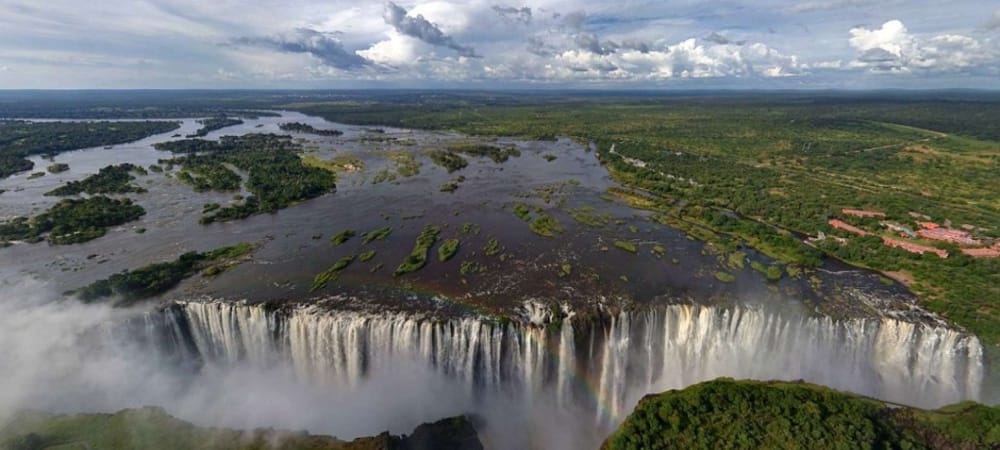
Seven reasons why you need to visit Zimbabwe

Author: Devryn Panaino - 26 September 2018
Last Update: 30 January 2024
Part of the Visit Zimbabwe & Travel To Zimbabwe & African Safari Collection
1. Victoria Falls and all it’s fun activities
For adrenaline seekers, Zimbabwe has endless adventures to offer. In just the town of Victoria Falls alone there’s white-water rafting on the Grade 5 rapids of the mighty Zambezi River, bungee jumping, horseback safaris, gorge swinging, zip lining, abseiling and crocodile cage diving.
2. Khami Ruins
History buffs will love the ancient archaeological site of the Khami Ruins.

You’ll be able to walk around atmospheric stone ruins that tell fascinating stories about the country’s past.
3. Mana Pools National Park
Mana Pools is also one of the only parks in Africa where you can walk without a guide (although this isn’t recommended for safety reasons unless you have a lot of bush experience).
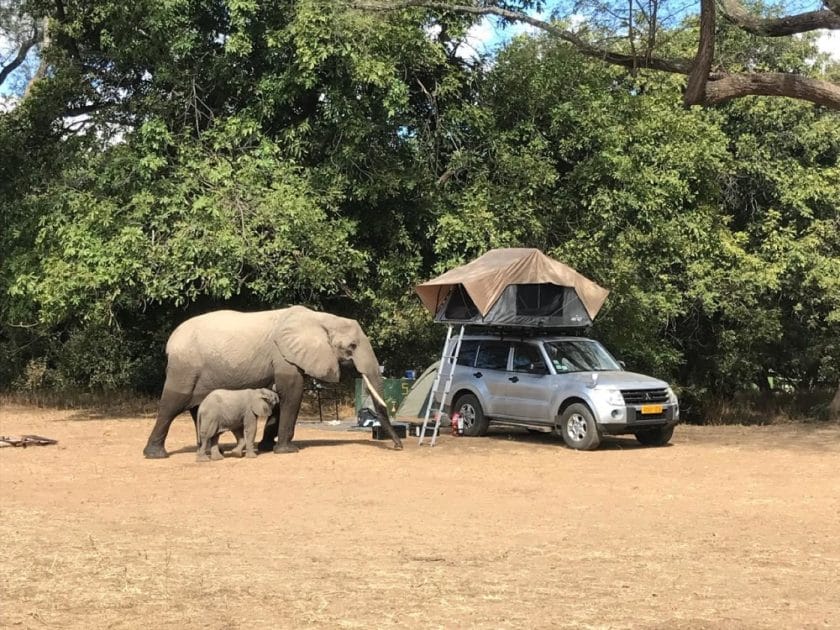
Mana Pools is remarkably beautiful: a riverine wilderness on the Zambezi River of pools, floodplains, baobab trees and forests that feels totally remote and never gets crowded.
4. Fishing Lake Kariba
If you prefer a more sedate way to spot game, staying on a houseboat on Lake Kariba is the answer. These floating hotels cruise the lake’s calm waters and provide a relaxing way of seeing game on the lake shore – either from the comfort of the houseboat deck or from smaller tender boats.
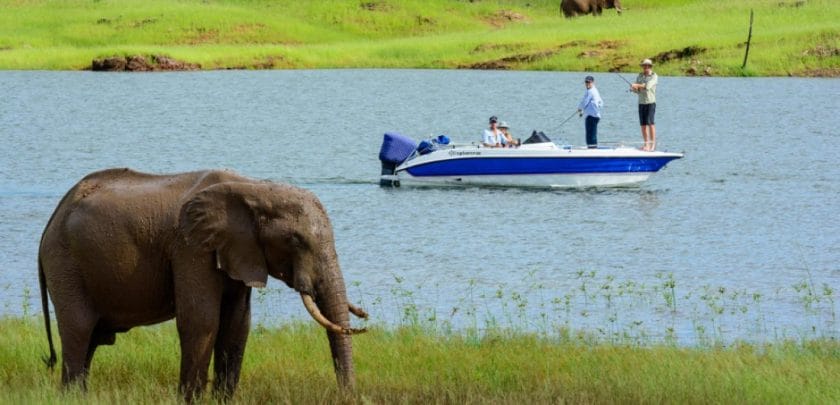
Fishing for tigerfish in Lake Kariba is also one of Zimbabwe’s most popular activities.
5. Thousands of elephants
Zimbabwe is home to one of the largest concentrations of elephants in the world. Only Botswana can begin to compete with Zimbabwe as a home of these gentle giants.
6. The friendliest people you’ll ever meet
Zimbabwean people are truly a joy to meet. Friendly, warm and always willing to help, you’ll be guaranteed to make more than a few friends during your safari tour.
7. Horseback safari experiences
One of the highlights of a safari experience must be exploring the untamed wilderness on horseback. This incredible activity can be arranged in almost every national park, including the surrounds of Victoria Falls. The Eastern Highlands is also a prime spot for horse riding.
8. Matobo Hills
One of the best places in Africa to see rock art, the scenically stunning Matobo National Park in the southwest of Zimbabwe has 3000 sites which date back more than 13 000 years dotted throughout a magical landscape of towering granite boulders.
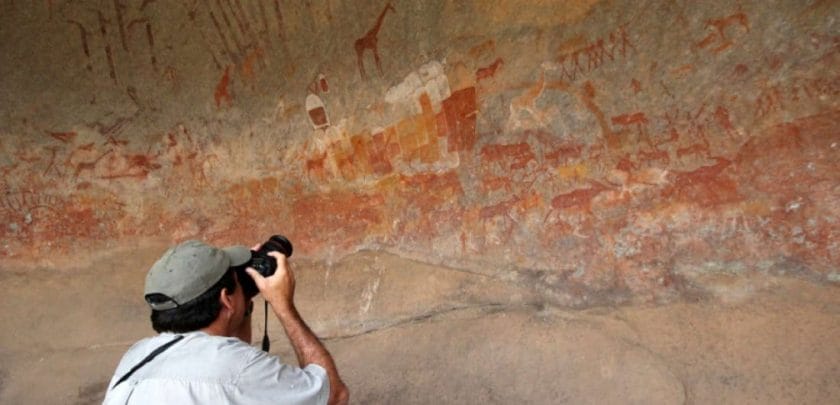
The park is easy to explore in your own car, and it’s also known for its leopard and white rhino sightings and huge number of eagle species.
Get the best of both worlds on a value-for-money Great Migration safari
Two weeks in Zimbabwe – a holiday itinerary
Related Safari Tours
These popular itineraries can be customised to match your budget and how many people you're planning to travel with..
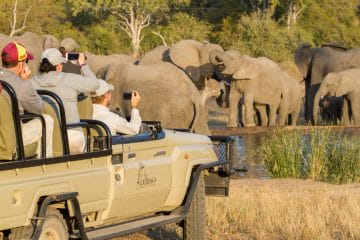
South Africa Big 5 Safari and Victoria Falls Jo...
Southern Africa South Africa Timbavati Sabi Sands Zimbabwe Victoria Falls
From $ 4090 /USD
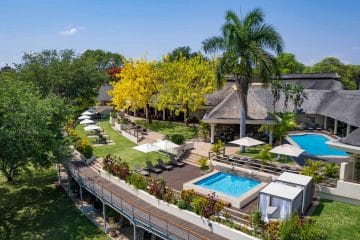
Vic Falls, Hwange and Matusadona Safari
Southern Africa Zimbabwe Hwange Victoria Falls
From $ 4820 /USD
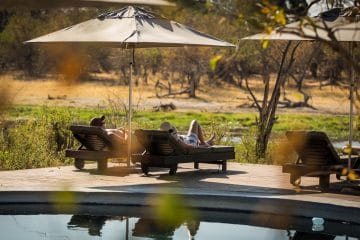
Untamed Botswana and Zimbabwe Safari
Southern Africa Botswana Okavango Delta Zimbabwe Hwange
From $ 6820 /USD
Why travel with us?
Recent reviews from travellers who planned and booked their africa trips with discover africa safaris, always helpful and available for any questions or concerns..
9 Day Safari And Cape Town Holiday Review
Carla, United States 17 Mar 2024
Efficient and professional.
Safari Review: 7 Day South Africa
Monica, Spain 21 Nov 2023
Informative website, megan was friendly and very helpful, great deal.
Highlights of Kenya & Tanzania Safari Review
Raymond Esparza, United States 10 Aug 2023
Incredible trip. diane was attentive, detailed, and extremely helpful.
Cape Town, Victoria Falls & Sabi Sand Safari Review
Dariusz, United States 02 Dec 2022
Excellent, efficient, fast, friendly, a lovely and friendly person with a good....
Kruger National Park Safari Review
Dr. Benhard Jansen van Vuuren and Zenobia Mertsch, South Africa 31 Aug 2021
Fantastic tour operator who pulled together a wonderful holiday for us at....
Safari Tours in Africa Review
Chris, United Kingdom 13 Jan 2021
Registered Members of these Organizations
USEFUL LINKS
- Safari Tours
- Accommodation
- Why Book with us?
- Safari Cost Estimator Tool
- Wildebeest Migration
- Privacy Policy
- Website Terms of Use
POPULAR COUNTRIES
- View All Countries
POPULAR DESTINATIONS
- View All Destinations
- Cape Town Holidays
- Kruger National Park
- Etosha National Park
- Chobe National Park
TRAVEL BLOGS
- How to Plan a Gorilla Trekking Safari in Rwanda
- AI Trip Planning Tools Making Travel Easier
- Travel News Digest, 3 May: Flooding in the Maasai Mara, Turtles Rescued in Cape Town
- Addo Deploys AI Collar Tracking to Combat Rhino Poaching
- 10 Years of HerdTracker on the Ground: Unforgettable Great Migration Encounters
OUR LOCATION
- 2nd floor, Tygervalley Chambers One, 27 Willie van Schoor Avenue, Bellville, Cape Town , 7530

Why Is Tourism Important in Zimbabwe?
By Anna Duncan
Tourism is an essential sector for Zimbabwe’s economy. The country has a rich and diverse cultural heritage, beautiful landscapes, and wildlife. This article will explore the reasons why tourism is vital to Zimbabwe’s economy.
Boosts Economy
Tourism is one of the largest contributors to Zimbabwe’s economy. It brings in foreign currency, creates jobs and business opportunities, and helps to promote economic growth.
According to the Zimbabwe Tourism Authority, the sector contributed $1.4 billion to the country’s GDP in 2018. This makes tourism a significant source of revenue for Zimbabwe.
Promotes Cultural Heritage
Zimbabwe has a rich cultural heritage that dates back centuries. Tourism plays a crucial role in promoting this heritage by showcasing traditional dances, music, food, and art. Visitors can experience Zimbabwean culture first-hand by visiting museums, attending festivals and events, and interacting with locals.
Preserves Wildlife
Zimbabwe is home to some of the world’s most magnificent wildlife reserves. Tourism helps to preserve these natural habitats by providing funding for conservation efforts. Additionally, tourists can participate in activities like game drives and guided tours that promote responsible wildlife viewing practices.
Creates Jobs
The tourism industry creates jobs directly and indirectly across various sectors such as hospitality, transport, retail, and entertainment industries. It provides employment opportunities for local people who might otherwise have limited options.
Promotes Infrastructure Development
Tourism provides an impetus for infrastructure development in Zimbabwe. The government invests in building roads, airports, hotels and other tourist facilities that help create a conducive environment for visitors.
9 Related Question Answers Found
How does tourism affect zimbabwe, is there a lot of tourism in zimbabwe, how much does tourism contribute to zimbabwe, what are the problems faced by tourism in zimbabwe, how can tourism be improved in zimbabwe, does zimbabwe rely on tourism, what is the importance of tourism in zambia, who is the minister of tourism in zimbabwe, how important is tourism in rwanda, backpacking - budget travel - business travel - cruise ship - vacation - tourism - resort - cruise - road trip - destination wedding - tourist destination - best places, london - madrid - paris - prague - dubai - barcelona - rome.
© 2024 LuxuryTraveldiva

Five Reasons We Should Support Local Tourism
Book top experiences and tours in zimbabwe:, victoria falls: guided walking tour, chobe day trip from victoria falls, zimbabwe, from kasane: victoria falls day trip (zimbabwe side), victoria falls: dinner cruise on the zambezi river.
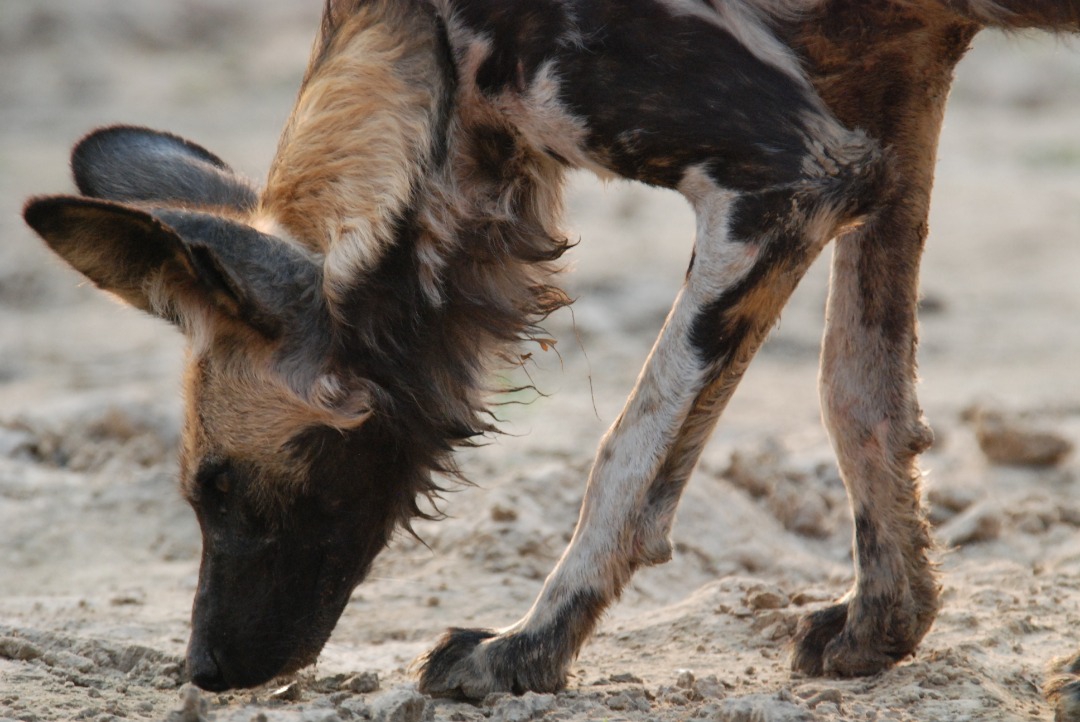
Create New Guide
Mini guides.
Login to create your guides for Zimbabwe.
Add to My Guide
- Add to New Guide
Recommended Experiences in Zimbabwe
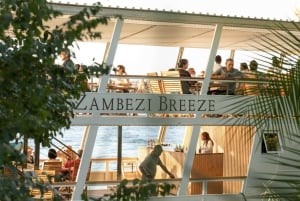
Embark on the Zambezi River with a dinner cruise and take in the glorious sunset color palette, surrounded by a wildlife paradise. Savor a unique 4-course meal on board as you admire the beauty of the setting sun.
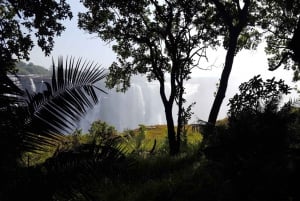
Nothing is quite like the heart-pounding sensation of actually standing on the edge of Victoria Falls, under the guidance of a professional whose knowledge about the falls is very vast and extensive.
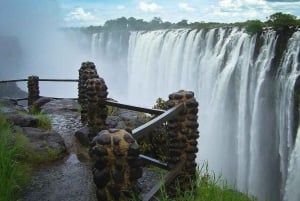
Discover one of the Seven Natural Wonders of the World, Victoria Falls, on a day trip from Kasane. Appreciate why locals call the falls "The Smoke That Thunders" as you visit different viewpoints. Explore local markets and the Victoria Falls Rainforest.
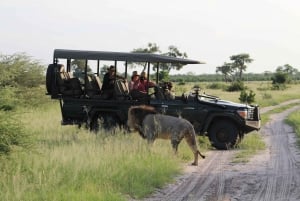
On this full-day tour you’ll go on a boat trip on the Chobe River and a game drive in Chobe National Park. The park is well known for its elephants and variety of animal species.
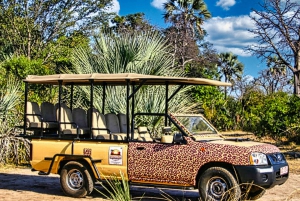
Victoria Falls: Rent Private Safari Jeep Game Viewer+Guide
Experience the bush or Victoria Falls in your own private Safari Jeep. Celebrating something special? Wanna do a photo shoot or a pic nic in the bush or in the area? Rent our Jeep with driver guide
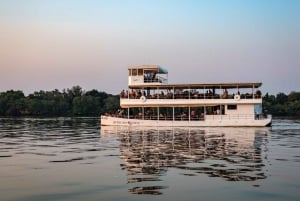
Livingstone: Zambezi River Sunset Cruise
Heed the call of Africa in the fading twilight hours on this fabulous 2-hour cruise along the Zambezi River upstream from the Victoria Falls. Admire the stunning sunset views while sipping traditional cocktails and enjoying delicious snacks.
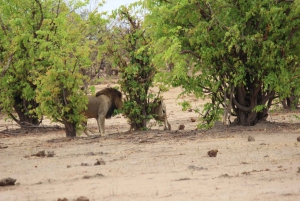
Chobe National Park: Game Drive, Boat Tour, and Lunch
Visit the world-renowned Chobe National Park, only a mere 80km away from Victoria Falls. Experience the Chobe National Park on a game drive as well as on a boat tour. Enjoy a buffet lunch at a highly-rated hotel overlooking the Chobe River.
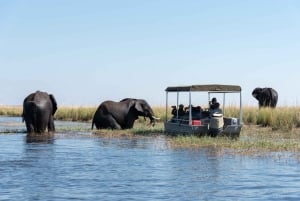
Chobe National Park: Day Trip with River Cruise
Experience Chobe National Park's beauty. Cruise the Chobe River, savor a buffet, and go on a game drive with your guide. Witness diverse wildlife in action for a day of adventure and discovery.
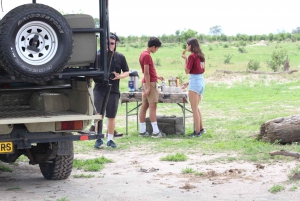
3-Day Chobe Camping Safari from Victoria Falls
Explore the Chobe National park in a quest to view the wild in their natural habitant. Spend the day inside this wonderful park with the guide giving you amazing insights to the behaviors and habitant of the wildlife in this area.
Local News & Articles
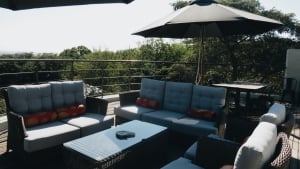
528 I Victoria Falls
528 I Victoria Falls is a family-run Bed and Breakfast located in Vic Falls. We were privileged to visit earlier this month to get a first-hand impression of the lodge. It is just a short drive from the heart of Victoria Falls, within easy reach of ...
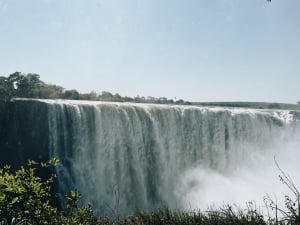
Self Drive Adventures 2024
This incredible 42 day circuit of Zimbabwe starts and ends in Johannesburg. We head into Zimbabwe from the south and travel in a clockwise direction. From our recent experience, on this route most of the national parks (other than at Victoria Falls and Hwange)...
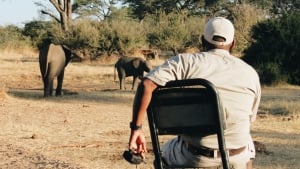
A Memorable Stay At Matetsi Victoria Falls
Matetsi Victoria Falls is a dreamy safari location that offers an extraordinary experience. We recently had the chance to stay at this luxury lodge. They provide a complimentary transfer and are located about 35 minutes drive from Victoria Falls,...
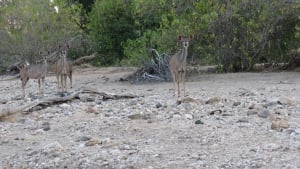
Kavinga Safari Camp - Mana Pools - A Memorable Experience
Kavinga Safari Camp is an exceptional wildlife destination that offers a remarkable experience for nature enthusiasts and wildlife lovers. Situated in a pristine wilderness area of Mana Pools, Kavinga Safari Camp provides a perfect combination of luxurious acc...
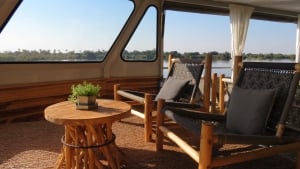
Pure Africa Cruise Experience Victoria Falls
I believe no Victoria Falls trip is complete without going on a river cruise. There is something incredibly relaxing about being on the water and being surrounded by all that beauty. On a recent trip to the resort town, we had the pleasure of sampling a sunset...
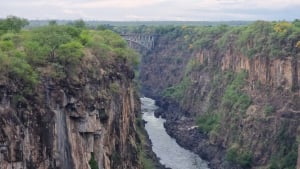
Our Unforgettable Experience At The Elephant Camp
What an amazing weekend we experienced at the Elephant Camp in Victoria Falls. The moment we landed at the Vic Falls International airport, the safari adventure began. An Elephant Camp shuttle was already waiting for us, a very friendly driver called Ben dropp...
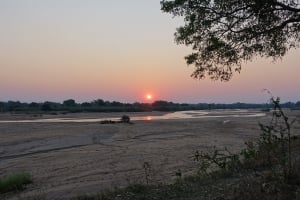
Newsletter September 2022
Hello to you all, and welcome to sunny and colourful September. September opens the final quarter of the year and as always the busiest one. As you will see the Events calendar is jam-packed with exciting things to look forward to and we know you will definite...

Our Visit To Matopo National Park
It was 5 pm and we were headed toward the Whovi Wild Area exit and back to the campsite, we were to sleep in. Whovi is part of the Matopo Hills National Park in Zimbabwe’s Matebeleland province. There, in a slashed fire-break with the golds of those perfect ...
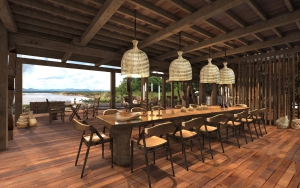
Newsletter October 2022
It's hot and there is flowery splendour everywhere, the signal that Summer is officially here! Welcome to blazing October and warm greetings to you all. If you love the hot season you are in your element right now, and have every reason to be happy; with pool ...
Create & Share your own Guide to Zimbabwe with friends and family!
Add your recommended places to visit by browsing the website and pressing the icon.
Create your own guide of favourite 'must see' places
Earn your Local Expert badge by Sharing your guides with others
Get your guide seen by submitting it to the Mini Guides section
Best Honeymoon/Romantic Getaway Locations
Handpicked by a Local Expert
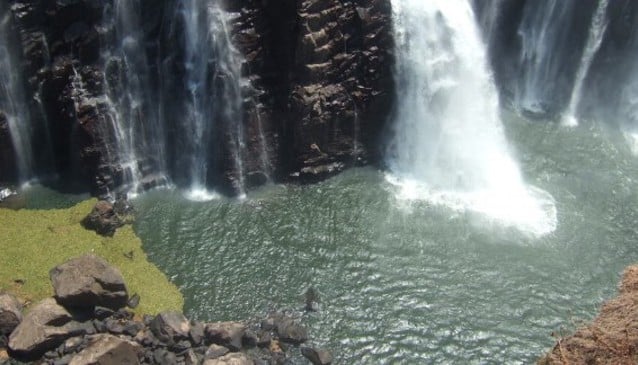
Top 5 Things To Do in Zimbabwe
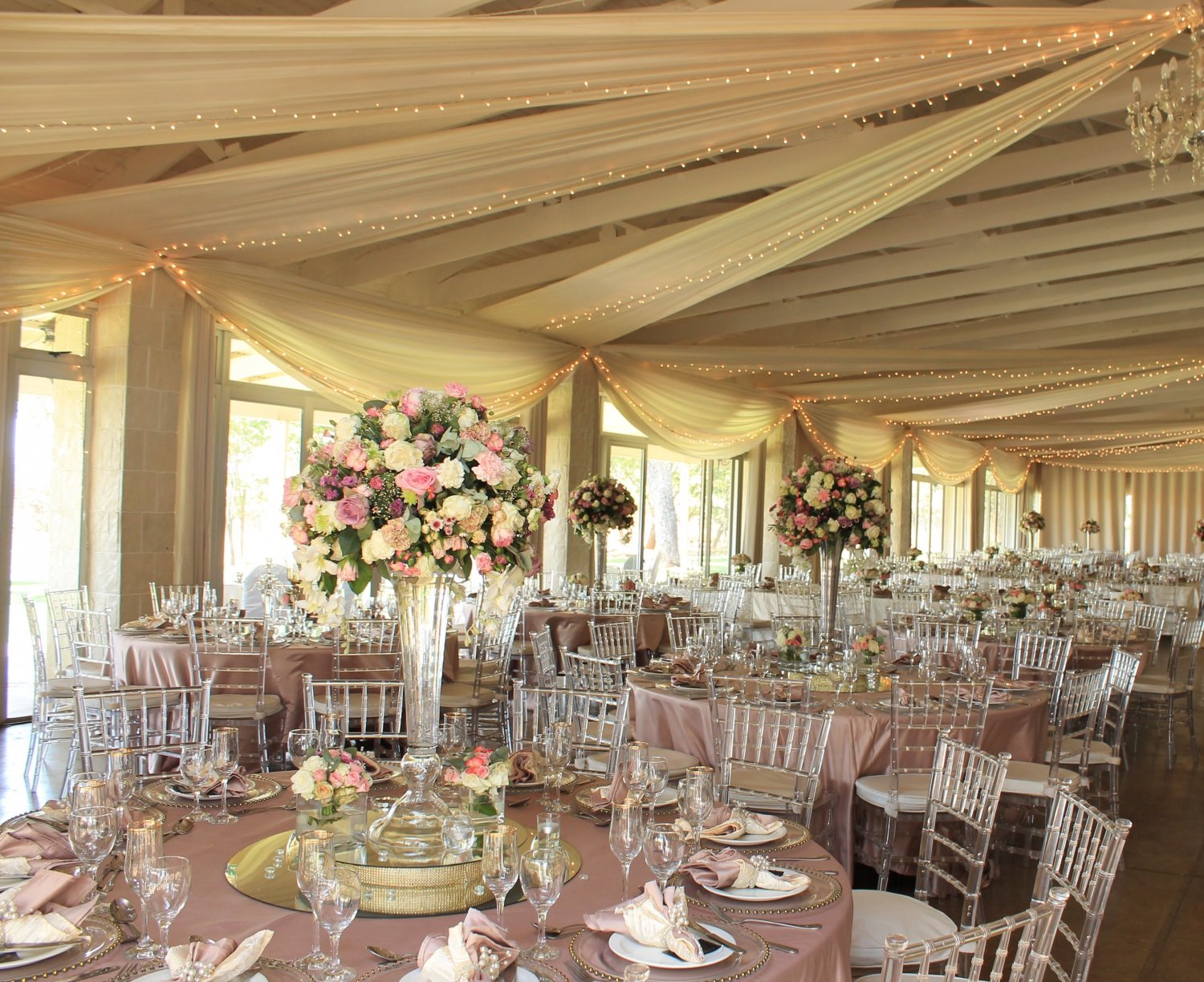
Best Wedding Venues in Zimbabwe
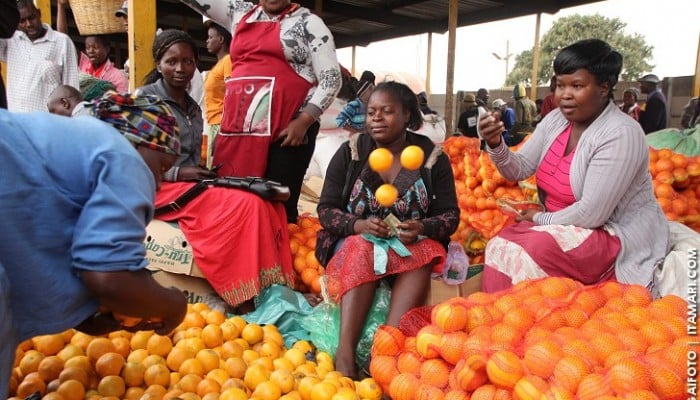
Top 5 Places For Curio Shopping
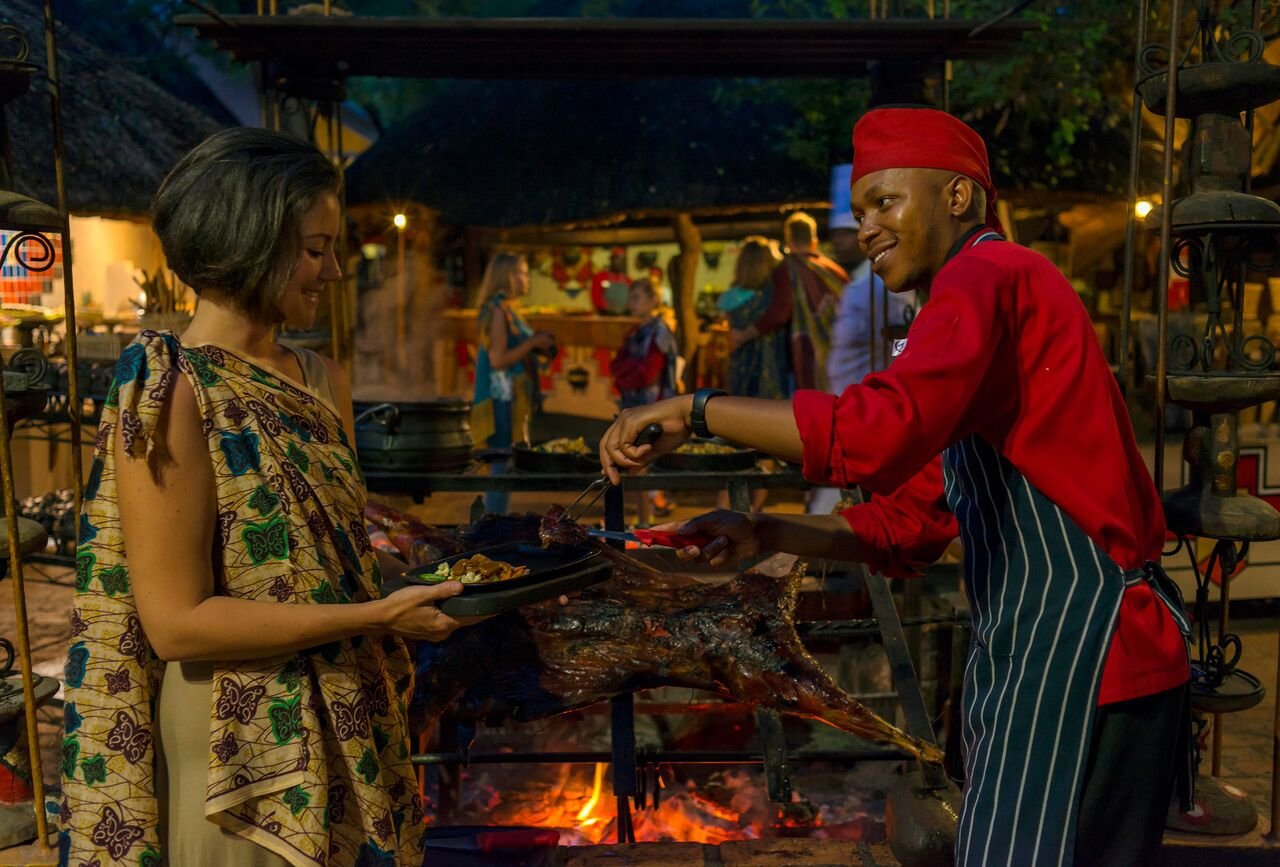
Top 5 Local Cuisine Restaurants
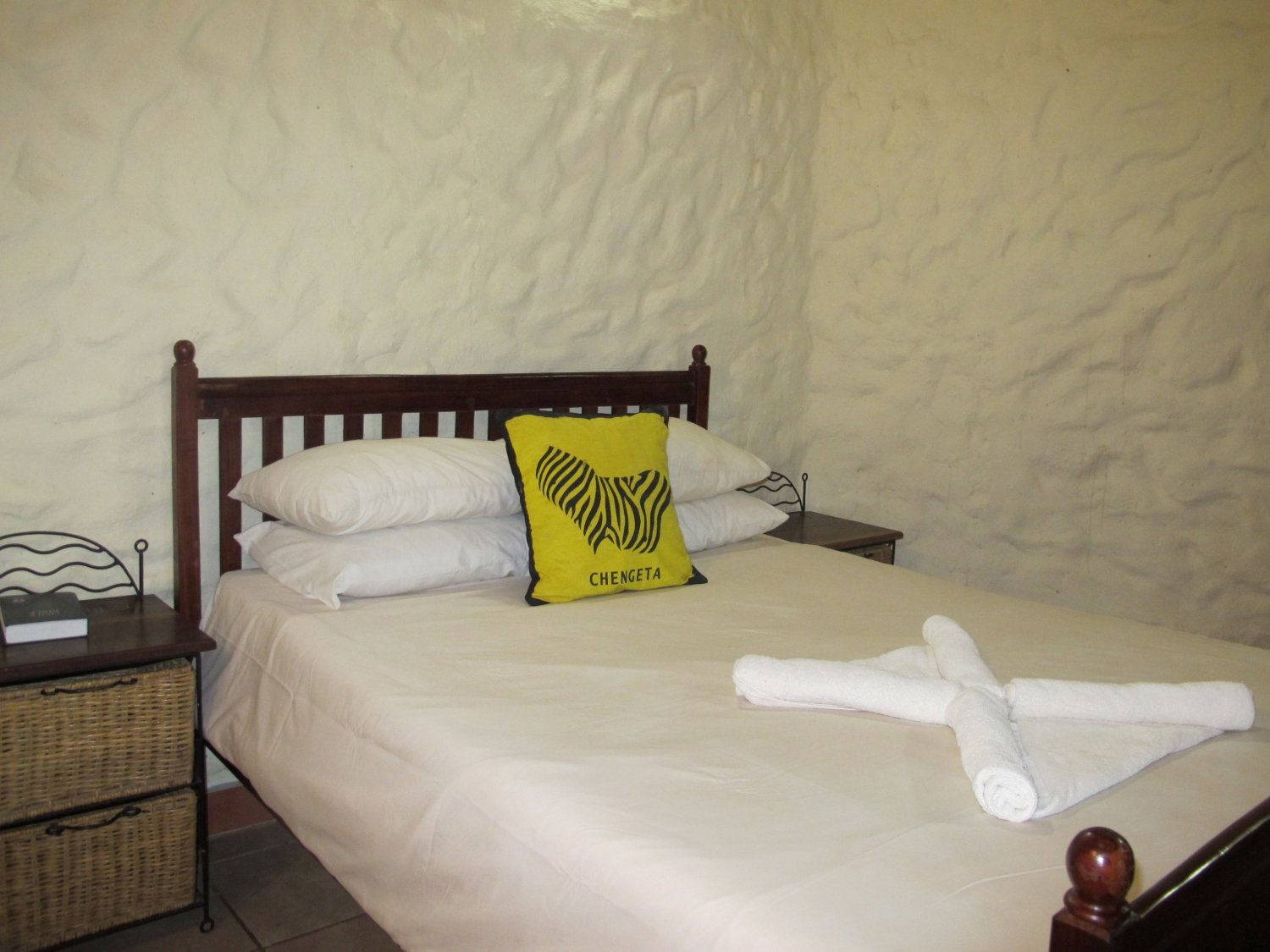
Best Team Building Spots
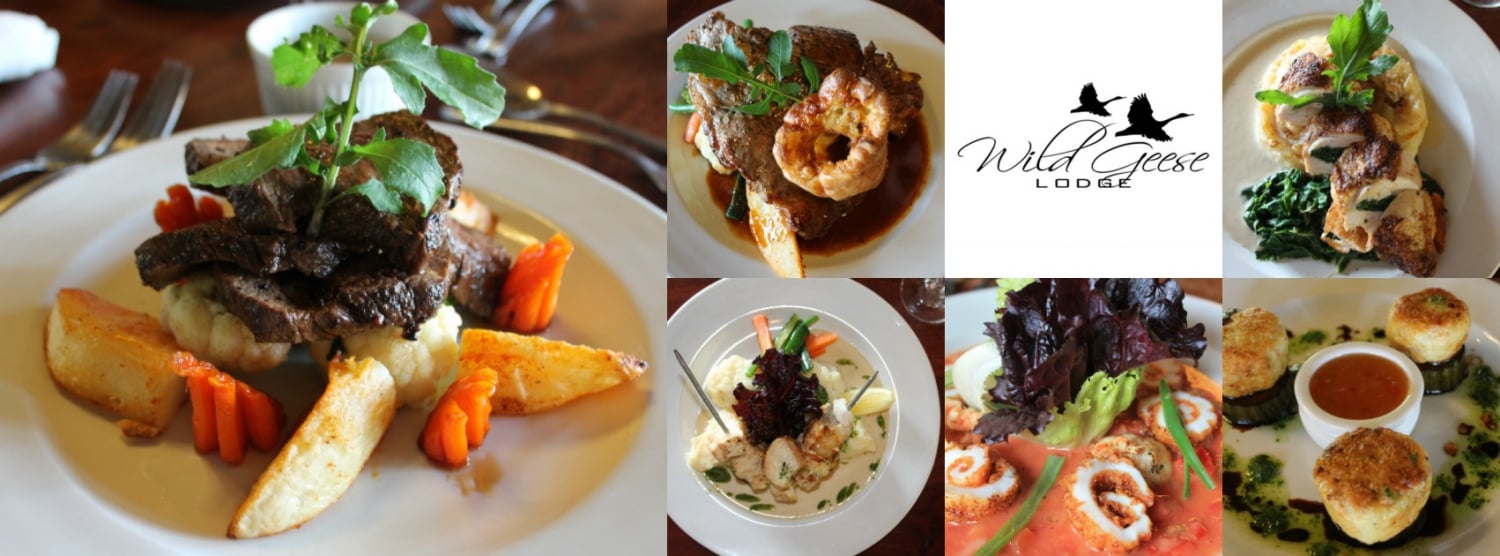
Top Five Conference Venues
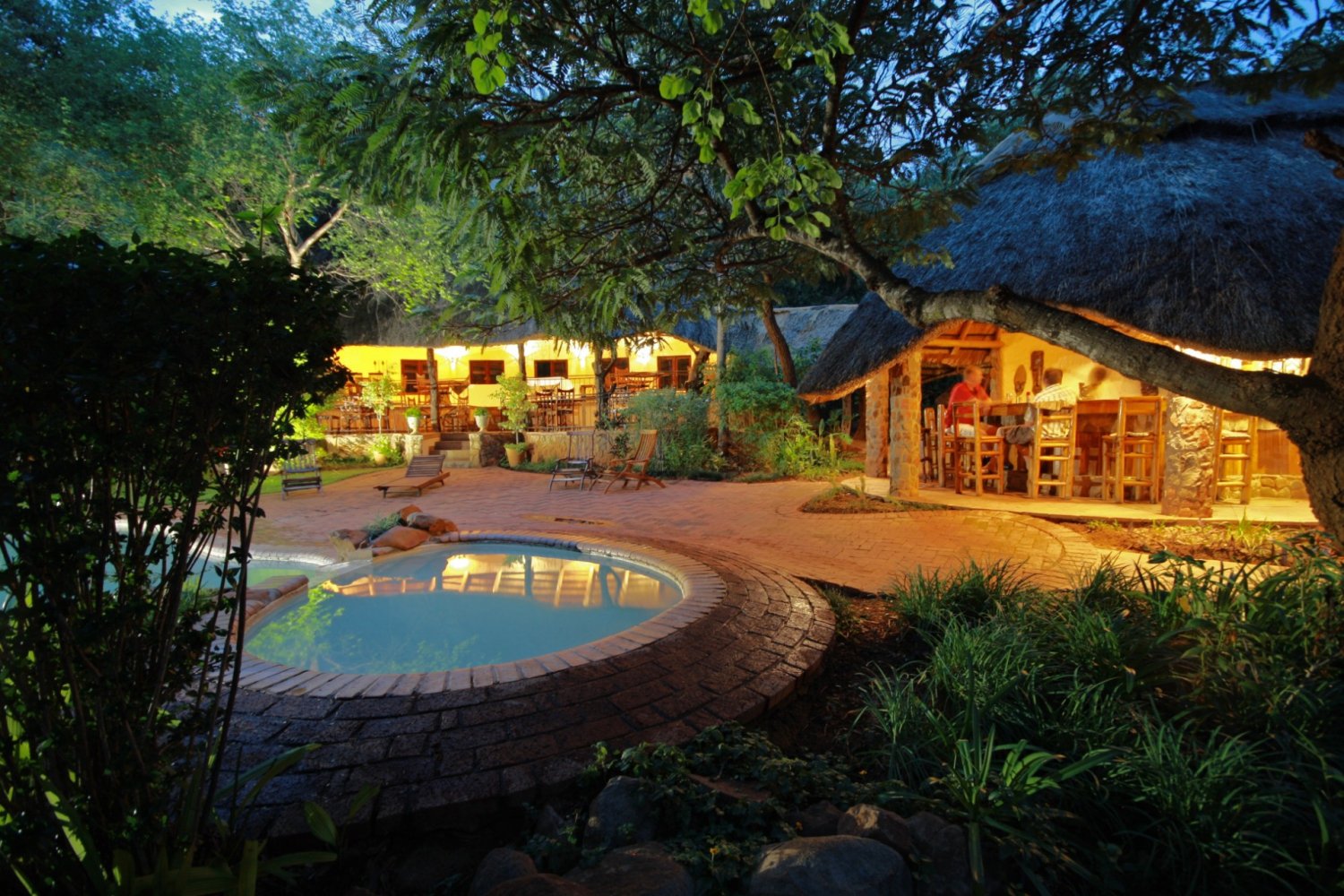
Must See Places For First Timers
My favourite places.
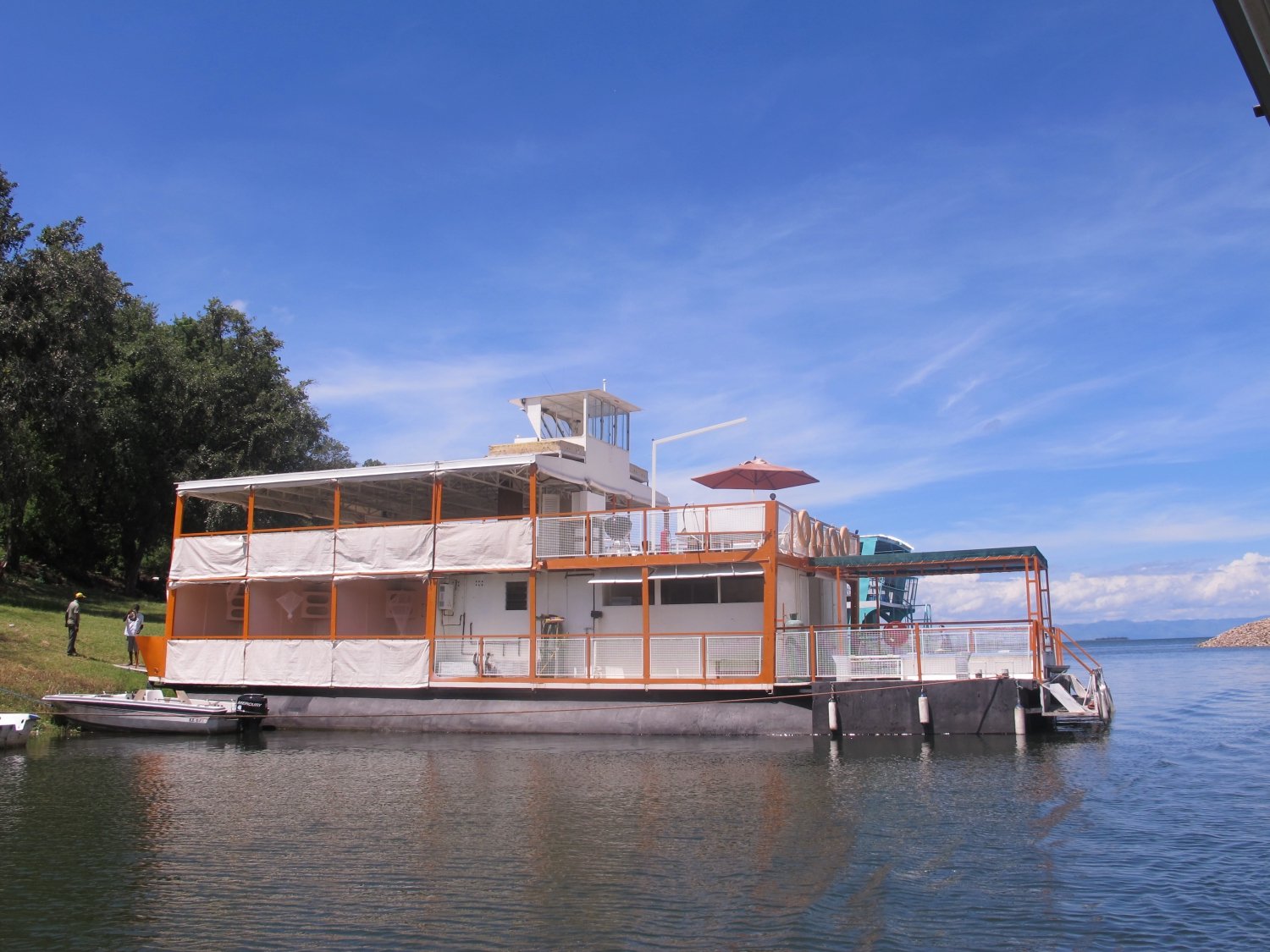
Best Middle Of The Range Houseboats
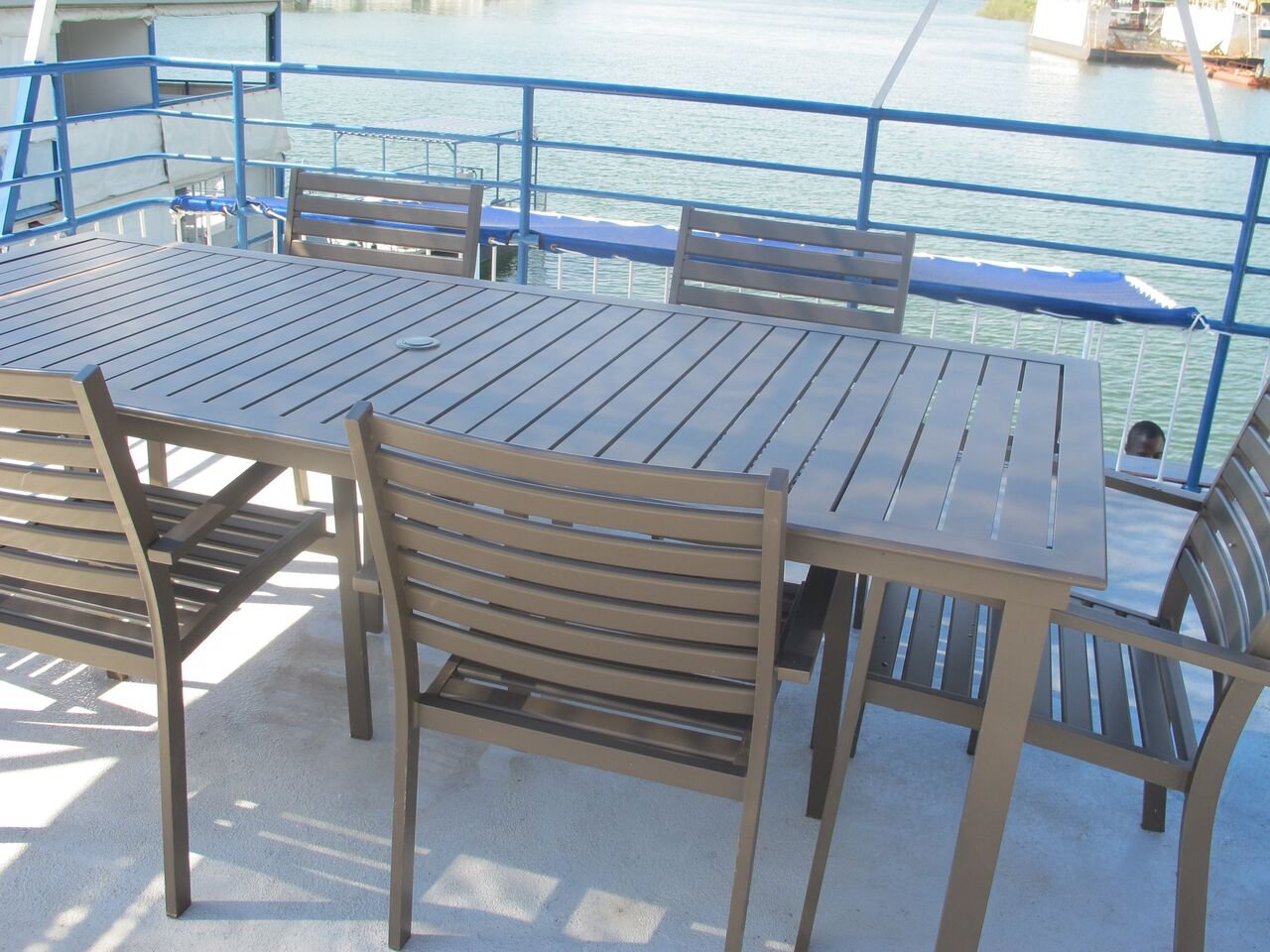

Best Luxury Houseboats

Best Glamping Locations
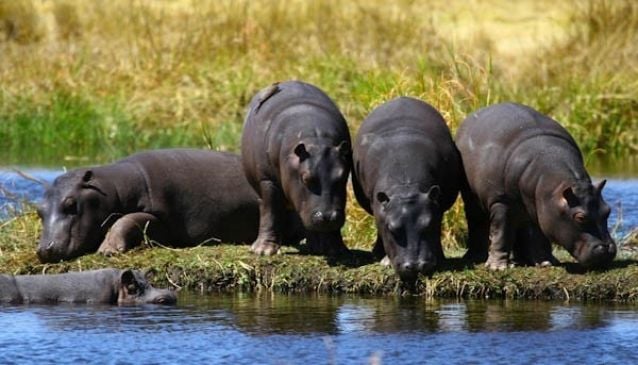
Best Private Game Parks Around Harare

Best Child Friendly Restaurants And Leisure Centres - Harare

We Are Part of the My Guide Network!
My Guide Zimbabwe is part of the global My Guide Network of Online & Mobile travel guides.
We are now in 120+ Destinations and Growing. If you are interested in becoming a local travel partner and would like to find out more then click for more info about our Website Business Opportunity .
Nearby Destinations
- My Guide Zambia
- My Guide Botswana
- My Guide Johannesburg
- My Guide Durban
- My Guide Namibia
- My Guide Tanzania
- My Guide Eastern Cape
- My Guide Garden Route
- My Guide Cape Town
No results found
Select Category first
{[{item.label}]}
- {[{data.title}]}
Events in Zimbabwe
Filter Events by Sub-Category
- This Weekend
- August 2024
- September 2024
- October 2024
- November 2024
- December 2024
Please select a Date first.
UN Tourism | Bringing the world closer
Share this content.
- Share this article on facebook
- Share this article on twitter
- Share this article on linkedin
UNWTO Supports Zimbabwe to Measure Value of Tourism
- 23 Jun 2021
UNWTO commits to work with the Government of Zimbabwe to measure the importance of tourism for the country’s economy.
Zimbabwe has identified tourism as a central pillar of its National Development Strategy, (NDS 1, 2021-2025). To reflect this, UNWTO is now working with the government on the development of the country’s first Tourism Satellite Account (TSA). The TSA will measure tourism’s contribution to Zimbabwe’s GDP, as well as its size relative to other sectors, and the number of jobs it generates. It will also allow the government to measure the value of public and private investment related to the sector and the effect of international tourism on the country’s balance of payments.
Mr Munesu Munodawafa, the Permanent Secretary in the Ministry of Environment, Climate, Tourism and Hospitality Industry, said, “As we continue to invest in the recovery and re-development of tourism across Zimbabwe, we must be able to accurately measure the importance of tourism to the country’s economy. The development of the TSA is one of the key milestones for the sector under the NDS1 (2021-2025). This tool is critical to aid Government’s decision making and evidence-based policy formulation for a sustainable and resilient tourism sector post COVID-19.”
Elcia Grandcourt, UNWTO Director for Africa said, “We are delighted to work again with Zimbabwe in this important endeavour. We are committed to supporting the government in providing clear data that can help guide key decisions for tourism’s recovery and growth.”
The initiative forms part of the four-year Zimbabwe Destination Development Program, a technical assistance initiative supported by IFC, a member of the World Bank Group. It is being delivered by the Ministry of Environment, Climate, Tourism and Hospitality, the Ministry of Transport and Infrastructure, and sponsored by the Government of Japan. The program supports the recovery of Zimbabwe’s tourism industry and aims to safeguard thousands of jobs amid a sharp decline in travel caused by the global COVID-19 pandemic.
Related links
- Download the news release in PDF
- UNWTO Regional Department for Africa
Related Content
Seychelles draft tourism, seychelles tourism department charts a path to sustaina..., when tourism meets handicrafts in madagascar, message of elcia grandcourt, un tourism regional direct....

Tourism in Zimbabwe

Zimbabwe boasts a diverse array of tourist attractions, located in almost every region of the country. From the awe-inspiring natural wonders of Victoria Falls and the Zambezi River to the ancient historical sites like the Great Zimbabwe ruins, this southern African nation offers a wealth of experiences for visitors.
Before the economic challenges of recent decades, much of the tourism for these locations was centered on the Zimbabwean side. However, neighboring countries like Zambia have also benefited from the draw of Zimbabwe’s top attractions.
Nonetheless, Zimbabwe remains a prime destination for those seeking to explore its natural beauty, rich cultural heritage, and abundant wildlife.
The Zimbabwe Tourism Ecosystem
The tourism industry in Zimbabwe is overseen and supported by the Zimbabwe Tourism Authority (ZTA), a statutory body established in 1996 to promote and develop the country as a premier tourist destination. The ZTA works closely with the Ministry of Tourism and Hospitality Industry, which is responsible for formulating policies and strategies to grow the sector.
Together, the public and private sectors collaborate to market Zimbabwe’s tourism offerings both domestically and internationally. This includes organizing major events, developing new tourism products, and ensuring high standards of service and sustainability.
Types of Tourism in Zimbabwe
Zimbabwe caters to a diverse range of tourist interests and activities. Some of the key types of tourism in the country include:
- Wildlife and Safari Tourism: Zimbabwe is renowned for its exceptional wildlife viewing opportunities, particularly in its network of national parks. Destinations like Hwange National Park and Mana Pools National Park (a UNESCO World Heritage site) offer the chance to spot the “Big Five” (lions, leopards, rhinoceros, elephants, and buffalo) as well as a wealth of other species.
- Cultural and Heritage Tourism: Zimbabwe is home to a rich cultural diversity, with numerous historical sites and traditional communities that offer visitors a glimpse into the country’s past. The Great Zimbabwe ruins, Khami Ruins, and Matobo Hills are just a few of the notable heritage attractions.
- Adventure Tourism: Zimbabwe’s diverse landscapes provide ample opportunities for thrilling outdoor pursuits. Activities such as whitewater rafting on the Zambezi River, bungee jumping at Victoria Falls, and hiking in the Eastern Highlands are popular with adventure-seekers.
- Ecotourism and Nature-based Tourism: With its abundance of national parks, scenic natural wonders, and commitment to conservation, Zimbabwe appeals to eco-conscious travelers. Sustainable tourism initiatives and eco-lodges allow visitors to experience the country’s wildlife and landscapes responsibly.
Importance and Benefits of Tourism in Zimbabwe
Tourism plays a vital role in Zimbabwe’s economy, contributing significantly to the country’s GDP and employment. The industry provides jobs and income for thousands of Zimbabweans, particularly in rural areas where tourism is often a primary economic driver.
Beyond the economic benefits, tourism also serves as a platform for cultural exchange and preservation. Visitors have the opportunity to engage with local communities, learn about traditional practices, and support the conservation of Zimbabwe’s rich cultural heritage.
Moreover, the revenue generated from tourism helps fund important conservation efforts, ensuring the protection of Zimbabwe’s diverse ecosystems and wildlife. This, in turn, safeguards the country’s natural assets for future generations of Zimbabweans and global travelers alike.
International Tourists in Zimbabwe
Zimbabwe has historically attracted visitors from a diverse range of nationalities, with the majority arriving on short-term stays. According to data from the Zimbabwe Tourism Authority, the top source countries for international tourists in recent years have been South Africa, with over 700,000 arrivals in 2017, followed by Malawi, Zambia, Mozambique, and Botswana, all of which have contributed significant numbers of visitors.
Beyond its regional neighbors, Zimbabwe has also attracted travelers from further afield, including the United States, United Kingdom and Ireland, Germany, Japan, and the Democratic Republic of the Congo, with each of these countries sending over 30,000 visitors in 2017. Overall, Zimbabwe’s diverse appeal has drawn tourists from across the globe, with a strong base of regional travelers complemented by a growing international market.
Top Destinations in Zimbabwe
Victoria falls and the zambezi river.
Undoubtedly the crown jewel of Zimbabwe’s tourism landscape, the mighty Victoria Falls is one of the Seven Natural Wonders of the World. Straddling the border between Zimbabwe and Zambia, this breathtaking waterfall plunges over 100 meters into the Zambezi River, creating a thunderous display of power and beauty.
Visitors can experience the falls from various vantage points, including the Victoria Falls National Park on the Zimbabwean side. Activities such as bungee jumping, whitewater rafting, and helicopter rides offer adrenaline-fueled ways to appreciate the falls. The surrounding area also provides opportunities for more serene pursuits, like guided walking tours and sunset cruises along the Zambezi.
Hwange National Park
As Zimbabwe’s largest national park, Hwange is a premier destination for wildlife enthusiasts. Covering an area of over 14,600 square kilometers, the park is home to a diverse array of species, including the “Big Five” as well as a significant population of African elephants.
Visitors can embark on guided game drives, walking safaris, and night drives to spot the park’s abundant wildlife. Accommodation options range from luxury lodges to more budget-friendly campsites, allowing travelers to immerse themselves in the heart of this vast and untamed wilderness.
Mana Pools National Park
Designated as a UNESCO World Heritage site, Mana Pools National Park is renowned for its exceptional biodiversity and scenic beauty. The park’s floodplains, dotted with ox-bow lakes and riverine forests, provide a haven for a wide range of wildlife, including elephants, hippos, and a variety of bird species.
Visitors can explore Mana Pools through guided walking safaris, canoe trips, and self-drive game drives. The park’s remote location and limited infrastructure contribute to its sense of unspoiled wilderness, making it a popular destination for those seeking an authentic and immersive safari experience.
Great Zimbabwe Ruins
One of Zimbabwe’s most significant historical and cultural attractions, the Great Zimbabwe ruins are the remains of an ancient city that was once the capital of the Kingdom of Zimbabwe. These impressive stone structures, built without the use of mortar, are a testament to the architectural and engineering prowess of the region’s medieval inhabitants.
Visitors can wander through the ruins, which include the iconic Great Enclosure and the Hill Complex, and learn about the site’s rich history and the culture of the Shona people who constructed it. The ruins have been designated a UNESCO World Heritage site and offer a fascinating glimpse into Zimbabwe’s pre-colonial past.
Matobo Hills
The Matobo Hills, located just south of Bulawayo, are a unique and visually striking landscape of granite kopjes (rounded boulders) and wooded valleys. This area, which was named a UNESCO World Heritage site in 2003, holds great cultural and historical significance for the Ndebele people.
Visitors can explore the Matobo Hills through guided hikes, rock art tours, and visits to historical sites associated with figures like Cecil Rhodes and the Shangani Patrol. The area is also renowned for its diverse wildlife, including a significant population of black and white rhinoceros.
Nyanga National Park
Situated in the Eastern Highlands, Nyanga National Park is a haven for outdoor enthusiasts and nature lovers. The park’s diverse landscapes, ranging from rugged mountains to lush forests and cascading waterfalls, provide ample opportunities for hiking, trout fishing, and birdwatching.
One of the park’s main attractions is Mount Nyangani, the highest peak in Zimbabwe at 2,593 meters. Visitors can challenge themselves with hikes to the summit, which offer panoramic views of the surrounding countryside. Nyanga National Park also boasts a rich cultural heritage, with numerous ancient rock art sites and traditional villages to explore.
Zimbabwe’s Unique Cultural and Historical Attractions
In addition to its natural wonders, Zimbabwe is home to a wealth of cultural and historical sites that offer visitors a deeper understanding of the country’s past and present.
Ancient Rock Art and Cave Paintings
Zimbabwe is renowned for its impressive collection of ancient rock art and cave paintings, which provide a glimpse into the lives and beliefs of the region’s earliest inhabitants. These intricate artworks, found in various locations throughout the country, depict scenes of daily life, spiritual rituals, and interactions with the natural world.
One of the most notable rock art sites is the Domboshawa Caves, located just outside of Harare. Visitors can explore the caves and marvel at the well-preserved paintings, which are believed to be the work of the San people, who inhabited the region thousands of years ago.
Traditional Villages and Cultural Experiences
Across Zimbabwe, visitors have the opportunity to immerse themselves in the country’s vibrant traditional cultures. Many communities offer guided tours of their villages, allowing travelers to witness firsthand the daily lives, customs, and crafts of the local people.
In the Matabeleland region, the Ndebele people are renowned for their colorful, intricate beadwork and distinctive architectural styles. Visitors can interact with Ndebele artisans, learn about their traditions, and even participate in cultural activities like traditional dance performances.
Medieval-Era City Ruins
Zimbabwe is distinctive in Africa for its large number of well-preserved medieval-era city ruins, built in a unique dry stone style. These ancient sites offer a fascinating glimpse into the advanced urban planning and architectural prowess of the region’s pre-colonial inhabitants.
The most famous of these ruins is the Great Zimbabwe, which was once the capital of the Kingdom of Zimbabwe. Other notable sites include the Khami Ruins, Dhlo-Dhlo, and Naletale, each with its own unique features and historical significance.
Colonial History and Heritage Sites
Zimbabwe’s colonial past is also reflected in its diverse range of heritage sites and landmarks. Visitors can explore historic buildings, museums, and monuments that tell the story of the country’s transition from a British colony to an independent nation.
One of the most iconic colonial-era sites is the Victoria Falls Hotel, which has been welcoming guests since 1904. Other notable destinations include the National Archives of Zimbabwe, which houses an extensive collection of historical documents and artifacts, and the Bulawayo Railway Museum, which showcases the region’s transportation history.
Wildlife and Safari Experiences
Zimbabwe’s national parks and wildlife reserves are renowned for their exceptional opportunities to observe a diverse array of animal species in their natural habitats.
Big Game Viewing
Zimbabwe is home to significant populations of the “Big Five” – lions, leopards, rhinoceros, elephants, and buffalo – as well as a wealth of other iconic African wildlife. Destinations like Hwange National Park and Mana Pools National Park are particularly renowned for their abundant and diverse wildlife.
Visitors can embark on guided game drives, walking safaris, and night drives to spot these magnificent creatures in their natural environments. The chance to observe these animals up close, in their natural habitats, is a truly awe-inspiring experience.
Birdwatching and Birding Hotspots
Zimbabwe is a birdwatcher’s paradise, with over 600 recorded species of birds. The country’s diverse ecosystems, from the lush forests of the Eastern Highlands to the wetlands of Mana Pools, provide habitats for a wide variety of avian species.
Popular birding destinations include the Vumba Mountains, the Chimanimani Mountains, and the Mana Pools National Park. Guided birdwatching tours and self-guided excursions allow visitors to spot endemic and migratory birds, as well as some of the region’s most unique and colorful feathered residents.
Guided Walking Safaris
For a more immersive and intimate wildlife experience, many of Zimbabwe’s safari operators offer guided walking safaris. These excursions allow visitors to explore the bush on foot, accompanied by experienced guides who can provide insights into the local flora, fauna, and ecosystem.
Walking safaris offer the opportunity to track animals, observe their behavior up close, and gain a deeper appreciation for the delicate balance of the natural world. This type of safari experience is particularly popular in destinations like Mana Pools National Park, where the terrain and wildlife make it well-suited for on-foot exploration.
Self-Drive Safari Options
Zimbabwe also caters to self-drive safari enthusiasts, with well-maintained road networks and signposted routes through its national parks and wildlife reserves. This allows visitors to explore at their own pace and discover hidden gems along the way.
Popular self-drive destinations include Hwange National Park, Mana Pools National Park, and Gonarezhou National Park. Visitors can rent 4×4 vehicles and navigate the parks’ network of roads, stopping to observe and photograph the abundant wildlife.
Outdoor Activities and Adventures
In addition to its wildlife and cultural attractions, Zimbabwe offers a wealth of opportunities for outdoor enthusiasts and adventure-seekers.
Whitewater Rafting and Kayaking
The mighty Zambezi River, which flows along the border between Zimbabwe and Zambia, is renowned for its thrilling whitewater rapids. Visitors can embark on guided rafting and kayaking excursions, navigating the river’s Class III to V rapids for an adrenaline-fueled experience.
The most popular section for whitewater activities is the Batoka Gorge, located just downstream from Victoria Falls. Experienced outfitters offer multi-day rafting trips, allowing adventurers to immerse themselves in the stunning natural scenery and challenging rapids.
Hiking and Trekking in the Eastern Highlands
Zimbabwe’s Eastern Highlands, a series of mountainous areas near the border with Mozambique, provide ample opportunities for hiking and trekking. The region is home to the country’s highest peak, Mount Nyangani, as well as the Bvumba Mountains and the Chimanimani range.
Visitors can challenge themselves with hikes to the summit of Mount Nyangani, which offers panoramic views of the surrounding countryside. Alternatively, they can explore the Chimanimani Transfrontier Park, a protected area that straddles the Zimbabwe-Mozambique border and is renowned for its diverse endemic species and stunning landscapes.
Canoeing and Boating
Zimbabwe’s waterways, including the Zambezi River and the lakes and rivers of its national parks, offer excellent opportunities for canoeing and boating adventures. Visitors can embark on guided canoe trips to observe wildlife from the water, or enjoy more leisurely boat cruises to take in the scenic beauty of the country’s aquatic environments.
One of the most popular canoeing destinations is Mana Pools National Park, where visitors can paddle through the park’s network of ox-bow lakes and channels, spotting hippos, crocodiles, and a variety of bird species along the way.
Adrenaline Sports
For thrill-seekers, Zimbabwe provides a range of adrenaline-fueled activities, such as bungee jumping and zip-lining. The most famous of these is the bungee jump at Victoria Falls, where adventurers can leap from a platform suspended over the Zambezi River, with the thundering falls as a dramatic backdrop.
Other popular adrenaline sports include zip-lining through the forests of the Eastern Highlands and high-speed jet boat rides on the Zambezi River.
Accommodation Options
Zimbabwe offers a diverse range of accommodation options to suit the needs and budgets of various travelers.
Luxury Lodges and Resorts
For those seeking a high-end safari experience, Zimbabwe boasts an array of luxury lodges and resorts, often located within or adjacent to the country’s national parks and wildlife reserves. These properties typically feature spacious, well-appointed accommodations, gourmet dining, and a range of amenities and activities.
Examples of luxury lodges include Linkwasha Camp in Hwange National Park, Ruckomechi Camp in Mana Pools National Park, and Singita Pamushana Lodge in the Malilangwe Wildlife Reserve.
Budget-Friendly Hotels and Guesthouses
Travelers on a tighter budget can find a variety of more affordable hotel and guesthouse options in Zimbabwe’s major cities and towns. These properties offer clean, comfortable accommodations at a fraction of the cost of the high-end safari lodges.
Popular budget-friendly destinations include Harare, Bulawayo, and Victoria Falls, where visitors can find a range of budget-friendly hotels, hostels, and bed and breakfasts.
Camping and Safari Camps
For a more immersive and adventurous experience, Zimbabwe offers numerous camping and safari camp options within its national parks and wildlife reserves. These basic but comfortable accommodations allow visitors to sleep under the stars and wake up to the sounds of the African bush.
Many of the country’s safari operators and tour companies offer guided camping safaris, providing all the necessary equipment and support for a memorable outdoor adventure.
Unique and Eco-Friendly Stays
Zimbabwe also features a growing number of unique and eco-friendly accommodation options, catering to travelers with a strong interest in sustainable tourism. These properties often incorporate local materials and traditional design elements, while also prioritizing environmental conservation and community engagement.
Examples include the Bumi Hills Safari Lodge, which is built using sustainable materials and powered by solar energy, and the Imire Rhino and Wildlife Conservation, where visitors can participate in conservation activities and learn about the local ecosystem.
Getting Around Zimbabwe
Visitors to Zimbabwe have several transportation options to explore the country’s diverse destinations.
Self-Drive Opportunities
Zimbabwe’s well-maintained road network and signposted routes make it an excellent destination for self-drive safaris and independent exploration. Visitors can rent 4×4 vehicles and navigate the country’s national parks and scenic routes at their own pace.
However, it’s important to note that the deployment of widespread police roadblocks issuing fines for minor or non-existent infringements has had a negative impact on tourism in recent years. Travelers should be aware of this issue and plan accordingly.
Guided Tours and Transfers
For those who prefer a more organized and hassle-free experience, Zimbabwe offers a range of guided tour options and transfer services. Tour operators and safari companies provide transportation, as well as knowledgeable guides, to ensure visitors make the most of their time in the country.
These guided tours can range from day trips to multi-day safaris, covering a variety of destinations and activities.
Domestic Flights and Airports
Zimbabwe has several domestic airports that serve as hubs for air travel within the country. Airlines like Air Zimbabwe and Fastjet offer flights between major cities, allowing visitors to quickly and conveniently access different regions of Zimbabwe.
The country’s main international airport is the Robert Gabriel Mugabe International Airport in Harare, which connects Zimbabwe to other African nations as well as select international destinations. Smaller regional airports, such as those in Victoria Falls, Bulawayo, and Hwange, facilitate access to the country’s top tourist attractions.
Domestic flights can be a practical option for travelers looking to maximize their time and minimize long road journeys, especially when visiting destinations that are geographically dispersed across Zimbabwe.
Travel Planning and Logistics
Best time to visit zimbabwe.
Zimbabwe is a year-round destination, but the optimal time to visit can vary depending on your interests and preferences.
The dry season, which runs from May to October, is generally considered the best time for wildlife viewing, as animals congregate around water sources and vegetation is sparser, making them easier to spot. This period also coincides with the cooler, more comfortable winter months.
The wet season, from November to April, offers lush, green landscapes and the opportunity to witness the dramatic transformation of the country’s ecosystems. This is also the prime time for birdwatching, as many migratory species arrive in Zimbabwe during this period.
Visa Requirements and Entry Procedures
Most visitors to Zimbabwe require a visa, which can be obtained in advance or upon arrival at the country’s ports of entry. The type of visa required depends on the purpose and duration of the visit.
For tourists, a single-entry or multiple-entry visa is typically required. Zimbabwe typically offers visa-on-arrival options for citizens of many countries but visitors should check the latest visa requirements and application procedures on the website of the Zimbabwe Immigration Department or with their nearest Zimbabwean embassy or consulate.
Health and Safety Considerations
When planning a trip to Zimbabwe, it’s important to consider health and safety precautions. Visitors should ensure they are up-to-date with recommended vaccinations, such as those for yellow fever, hepatitis A and B, and typhoid.
Malaria is also a concern in certain regions of Zimbabwe, so travelers should consult with their healthcare provider about appropriate prophylaxis and take necessary precautions, such as using insect repellent and sleeping under mosquito nets.
It’s also advisable to research any current travel advisories or security concerns in the areas you plan to visit and to exercise caution when navigating the country, particularly when it comes to the deployment of police roadblocks.
Budgeting and Costs
The cost of a trip to Zimbabwe can vary significantly depending on factors such as the time of year, the type of accommodation, and the activities and experiences you choose to pursue.
Generally, visitors can expect to pay the following approximate costs:
- Accommodation: $50 to $500 per night, depending on the level of luxury
- Meals: $10 to $50 per person, depending on the type of dining establishment
- Activities: $50 to $200 per person for guided tours, safaris, and adventure activities
- Domestic transportation: $50 to $200 per person for self-drive or guided transfers
It’s important to factor in additional expenses such as international flights, visa fees, and travel insurance when budgeting for a trip to Zimbabwe.
Sustainable and Responsible Tourism
Conservation efforts and wildlife protection.
Zimbabwe is committed to the conservation of its natural resources and wildlife, with a strong focus on sustainable tourism practices. The country’s national parks and wildlife reserves are managed by the Zimbabwe Parks and Wildlife Management Authority, which works to protect the country’s diverse ecosystems and endangered species.
Initiatives such as anti-poaching patrols, habitat restoration, and community-based conservation programs help to safeguard Zimbabwe’s wildlife, including iconic species like the African elephant, black rhinoceros, and the endangered African wild dog.
Community-Based Tourism Initiatives
Zimbabwe has also made strides in developing community-based tourism initiatives, which aim to empower local communities and ensure that the benefits of tourism are shared more equitably.
These initiatives often involve the creation of community-run lodges, cultural experiences, and other tourism products that allow visitors to engage directly with local people and support their livelihoods. Examples include the Imire Rhino and Wildlife Conservation, where guests can participate in conservation activities and learn about the local ecosystem.
Eco-Friendly Practices and Green Accommodations
In line with its commitment to sustainable tourism, Zimbabwe is home to a growing number of eco-friendly accommodations and tourism operators that prioritize environmental conservation and responsible practices.
These properties often incorporate sustainable design elements, use renewable energy sources, and implement water-saving measures. They also work to minimize their carbon footprint and support local communities through employment and procurement of goods and services.
Visitors seeking a more eco-conscious travel experience can choose from a variety of green lodges, safari camps, and other sustainable tourism offerings across Zimbabwe.
Zimbabwe’s diverse tourism landscape offers a wealth of experiences for visitors, from the awe-inspiring natural wonders of Victoria Falls and the Zambezi River to the rich cultural heritage and abundant wildlife found throughout the country.
Whether you’re seeking an exhilarating safari adventure, a immersive cultural experience, or a serene outdoor escape, Zimbabwe has something to captivate and inspire every traveler.
With a commitment to sustainable tourism practices and a deep appreciation for its natural and cultural assets, Zimbabwe continues to solidify its reputation as a premier destination in southern Africa.
As you plan your journey to this remarkable country, be sure to explore the full breadth of Zimbabwe’s tourism offerings, from its iconic landmarks to its hidden gems.
With careful preparation and an open mind, you’re sure to create lasting memories and gain a deeper understanding of this dynamic and fascinating destination.
You may also like

Gonarezhou National Park: The Place of Elephants

The Limpopo River

Lake Kariba: Largest Man-Made Lake

City of Masvingo
Leave a reply cancel reply.
Your email address will not be published. Required fields are marked *
Save my name, email, and website in this browser for the next time I comment.

Tourism in Zimbabwe
Zimbabwe, also named the ‘world of wonders,’ is one of the world’s leading destinations. Zimbabwe’s tourism sector is a perfect choice when contemplating Zimbabwe’s investment because of its countless natural and cultural wonders and favorable environment all year round. It is maybe the most exciting sector in Zimbabwe since it is the fastest-growing sector that provides GDP to the countries, and it is ever rising by 6.1%. The tourism industry in Zimbabwe hires over 90,000 workers and presents various business opportunities.
A general overview
Zimbabwe’s Tourism Authority (ZTA) figures indicate that the number of visitors arriving in Zimbabwe declined 11% in 2019 from 2.29 million in 2018, attributed to destination photos’ political unrest following elections in August 2018 and to the stay-off demonstrations in January 2019. Most tourists have come from Africa and the Middle East, while the number of arrivals from Europe, the Americas, Oceania, and Asia has decreased. The ZTA reported that the extreme macro and rapid inflation conditions led to the decline in hotel occupancy rates for the world over the same period. Due to the detrimental consequences of the COVID-19 pandemic and the reduction in foreign tourism, the scenario will further deteriorate in 2020.
Leading Sub-Sectors
In recent years, the government funded investment in capital in the tourism sector by providing tax benefits and duty-free import status in some capital categories to the hotel, restaurant, and safari operators. Wildlife photography and hunting tourism often offer tremendous growth opportunities. Still, some conservations had trouble securing trophy hunting permits from the government when citizens wanted to gain the property’s advantage for indigenization through political maneuvers. The U.S. act also forbids the introduction into the United States of elephant trophies.
Opportunities
In Victoria Falls, comparatively limited real estate rates provide possibilities for constructing hotels and lodges. The region could also be helped by the designation of Victoria Falls as a special economic zone for tourists and an International Financial Centre. The government also widened the runway to handle any form of jumbo jets at Victoria Falls airport to build a new terminal for passengers. This means the infrastructure (road, train, water, telecommunications, and energy) is redundant and rehabilitated. As the world transitions to sustainable tourism, expert preparation, and direct investment in eco-travel and adventure travel companies are available. The Zimbabwe investment authority also recognizes prospects for constructing meetings and exhibition centers, resorts and casinos, and shopping malls. Zimbabwe investment authority ZIA Many in Zimbabwe cater to lavish tourist lodges, but the possibilities to create locations in the medium-sized sector would improve as tourists’ number rises.
Previous Post LE « GLOBAL TOURISM FORUM » EN COURS DE ROUTE AU GABON !
Next post tourism in germany, you may also like.

Open letter from Secretary General on current crisis and its solutions
Uzbekistan and Kazakhstan finalizing negotiations on launching Silk Road Visa

WTFI is registered with the number of UK00003455032 by Intellectual Property Office of United Kingdom
Privacy Policy & Terms of Service @ 2022 World Tourism Forum Institute
Developed by Hypno Digital

FEATURED CONTENT
WTFI Town Halls
HATT Business School
Phanos Matura Tourism Consultant, Masvingo City, Zimbabwe
Jemitias Mapira Department of Geography & Environmental Science, Great Zimbabwe University, Masvingo City, Zimbabwe
..................................................
Social Sciences Journals
European Journal of Economic and Financial Research
European Journal of Management and Marketing Studies
European Journal of Human Resource Management Studies
European Journal of Political Science Studies
Public Health Journals
European Journal of Public Health Studies
European Journal of Fitness, Nutrition and Sport Medicine Studies
European Journal of Physiotherapy and Rehabilitation Studies
Education Journals
European Journal of Education Studies
European Journal Of Physical Education and Sport Science
European Journal of Foreign Language Teaching
European Journal of English Language Teaching
European Journal of Special Education Research
European Journal of Alternative Education Studies
European Journal of Open Education and E-learning Studies
Literature, Language and Linguistics Journals
European Journal of Literature, Language and Linguistics Studies
European Journal of Literary Studies
European Journal of Applied Linguistics Studies
European Journal of Multilingualism and Translation Studies
........................................

- Other Journals
- ##Editorial Board##
- ##Indexing and Abstracting##
- ##Author's guidelines##
- ##Covered Research Areas##
- ##Related Journals##
- ##Manuscript submission##
TOURISM DESTINATIONS, FACILITIES, CHALLENGES AND OPPORTUNITIES IN ZIMBABWE
Major tourist attractions in Zimbabwe include: natural, cultural, historical, and wildlife found in game reserves and national parks. The Victoria Falls are among the major wonders of the country with a height of 108m and a width of up to 1708m. At peak flow of the Zambezi river nearly 550 million litres of water flow into the gorge. Due to the force of the water, the spray is pushed up into the sky reaching heights of over 400m which can be viewed from a distance of 50km away and can be felt throughout the town. Lakes Tokwe-Mukosi and Mutirikwi, Hwange and Gonarezhou national parks, Nyangani, Vumba and Chimanimani mountains, Great Zimbabwe Monuments and some cities are other attractions. This paper examines tourist attractions, facilities, arrivals, occupancy, challenges and opportunities in the country. It provides a comprehensive database of information about local tourist destinations, attractions and facilities in Zimbabwe. Since there is little information on the subject of Zimbabwe’s tourism destinations, this paper seeks to fill that gap. The information in this study was assembled in March 2018, based on document interrogation or literature surveys.
Article visualizations:
Bond, P. and Manyanya, M. 2003. Zimbabwe’s Plunge: Exhausted Nationalism and the Search for Social Justice, Weaver Press Ltd, Harare
Bulpin, T.V 1968. To the Banks of the Zambezi, Books of Africa, Cape Town
Chibaya, T. 2013 From “Zimbabwe Africa’s Paradise to Zimbabwe A World of Wonders”: Benefits and Challenges of rebranding Zimbabwe as a tourist destination, Developing Country Studies, Vol 3, No. 5.
Creswell, J.W. 2014. Research Design: Qualitative, Quantitative and Mixed Method Approaches. Thousand Oaks, CA: SAGE.
Mbaiwa, J.E 2011 Changes on traditional livelihood activities and lifestyles caused by tourism development in the Okavango Delta, Tourism Management Journal DOI: 10.1016/j.tourman.2010.09.002
Mpofu, T.G., Muponda, Z.M., Mutami, N., and Tavuyanago, B. 2009. ‘O’ Level Southern African History, Priority Projects Publishing, Harare
Meetings Zimbabwe 2015. Zimbabwe Tourism Publications, Imprint International, England.
Munowenyu, E.M. 1996. ‘A’ Level Geography: A Comprehensive Guide, Longman Zimbabwe, Harare
Munyenza, S. Zimbabwe Television (ZTV) Morning News, 12 February, 2018
Nyaruwata, S. & Runyowa, D. 2017 Visitor Perceptions on Zimbabwe as a tourist destinations and implications for policy directions. African Journal of Hospitality, Tourism and Leisure, Vol 6 (2).
Pearce, D. 1989. Tourist Development, Longman, Harlow
Sanderson, A., Nyamadzawo. J., Nyaruwata, S., and Moyo, C. 2013 Positioning The Zimbabwe Tourism Sector for Growth: Issues and Challenges. USAID Strategic Economic Research and Analysis – Zimbabwe (SERA) program, Harare
This Is Zimbabwe 2016-17. Zimbabwe Tourism Authority Publications, Land & Marine Publications Ltd, Harare, Zimbabwe.
Zimbabwe National Statistics Agency (ZIMSTAT) 2015/16. Visitor Exit Survey 2015/16 Report. Harare, Zimbabwe: ZIMSTAT
Zimbabwe Tourism Authority (ZTA), Tourism Trends and Statistics 2000. Harare, Zimbabwe
Zimbabwe Tourism Authority (ZTA), Tourism Trends and Statistics 2001. Harare, Zimbabwe
Zimbabwe Tourism Authority (ZTA), Tourism Trends and Statistics 2002 Harare, Zimbabwe
Zimbabwe Tourism Authority (ZTA), Tourism Trends and Statistics 2003. Harare, Zimbabwe
Zimbabwe Tourism Authority (ZTA), Tourism Trends and Statistics 2004, Harare, Zimbabwe
Zimbabwe Tourism Authority (ZTA), Tourism Trends and Statistics 2005. Harare, Zimbabwe
Zimbabwe Tourism Authority (ZTA), Tourism Trends and Statistics 2006. Harare, Zimbabwe
Zimbabwe Tourism Authority (ZTA), Tourism Trends and Statistics 2007. Harare, Zimbabwe
Zimbabwe Tourism Authority (ZTA), Tourism Trends and Statistics 2008. Harare, Zimbabwe
Zimbabwe Tourism Authority (ZTA), Tourism Trends and Statistics 2009. Harare, Zimbabwe
Zimbabwe Tourism Authority (ZTA), Tourism Trends and Statistics 2010. Harare, Zimbabwe
Zimbabwe Tourism Authority (ZTA), Tourism Trends and Statistics 2011. Harare, Zimbabwe
Zimbabwe Tourism Authority (ZTA), Tourism Trends and Statistics 2012. Harare, Zimbabwe
Zimbabwe Tourism Authority (ZTA), Tourism Trends and Statistics 2013. Harare, Zimbabwe
Zimbabwe Tourism Authority (ZTA), Tourism Trends and Statistics 2014. Harare, Zimbabwe
Zimbabwe Tourism Authority (ZTA), Tourism Trends and Statistics 2015. Harare, Zimbabwe
Zimbabwe Tourism Authority (ZTA), Tourism Trends and Statistics 2016. Harare, Zimbabwe
Zimbabwe Tourism Authority (ZTA), Tourism Trends and Statistics 2017. Harare, Zimbabwe
Zimbabwe Tourism Investor Guide 2014 Zimbabwe Tourism Authority Publications, Harare, Zimbabwe
Zimbabwe Tourism Authority (ZTA) Summary of Historical Statistics: 1964 to 2010, Research and Development Unit, Harare, Zimbabwe.

Copyright © 2016 - 2023. European Journal Of Social Sciences Studies (ISSN 2501-8590) is a registered trademark of Open Access Publishing Group . All rights reserved.
This journal is a serial publication uniquely identified by an International Standard Serial Number ( ISSN ) serial number certificate issued by Romanian National Library. All the research works are uniquely identified by a CrossRef DOI digital object identifier supplied by indexing and repository platforms. All the research works published on this journal are meeting the Open Access Publishing requirements and standards formulated by Budapest Open Access Initiative (2002), the Bethesda Statement on Open Access Publishing (2003) and Berlin Declaration on Open Access to Knowledge in the Sciences and Humanities (2003) and can be freely accessed, shared, modified, distributed and used in educational, commercial and non-commercial purposes under a Creative Commons Attribution 4.0 International License . Copyrights of the published research works are retained by authors.


Zimbabwe Tourism Authority(ZTA)
The Zimbabwe Tourism Authority is a Parastatal organization formed by an Act of Parliament: The tourism Act Chapter 14:20 of 1996 with a mandate of developing, managing, promoting and marketing Zimbabwe as a tourist destination in both the local and international markets.
As a National Tourism Organization (NTO), ZTA is responsible for tourism promotion, planning and development, research and enforcement of standards and services. Its overarching goal is to promote the sustainable growth and development of tourism in Zimbabwe for the social and economic benefit of the nation through setting and monitoring of standards, market research, product development, investment promotion and destination marketing. It falls under the Ministry of Tourism and Hospitality Industry led by Honourable Barbara Rwodzi(MP).
1.1 OUR CORE PURPOSE
To develop, manage and market Zimbabwe as a tourist destination as mandated by the Tourism Act 1996, Chapter 14:20.
1.2 OUR VISION
To be a must visit destination and leader in sustainable tourism in Africa by 2030
1.3 OUR MISSION
To serve the interests of the tourism industry through effective and efficient utilization of our resources for the benefit of the national economy
1.4 OUR CORE VALUES
We will fulfill our mission guided by the following values:
Teamwork – We work as a team and appreciate each other’s role in the organisation.
Results Driven – We deliver, that is what sets us apart.
Innovation – We are creative.
Professionalism – We are ethical in our business conduct.
Service Culture – We are here to serve; this drives our relationship with our stakeholders and clients
According to Section 5 of the Tourism Act 1996, Chapter 14:20“(1) Subject to this Act, the functions of the Authority shall be:
a) To promote Zimbabwe as a destination for tourists and to promote the tourism industry in overseas, regional and domestic markets. b) to develop marketing skills and initiatives within the industry c) to promote high standards in the tourist industry through the establishment of standards, training and human resources development d) to register and grade designated tourist facilities e) to promote the development of tourist facilities f) to undertake planning for the tourist industry, including the conducting of market research and the development of a tourism data base g) to promote awareness in Zimbabwe of the benefits of tourism h) to provide consultancy and advisory services in relation to tourism i) to investigate and make recommendations to the minister on any matter affecting the tourism industry and the administration of the act j) On its own initiative or at the request of the Minister to carry out any functions that May be conferred to or imposed on the Authority by or under the Tourism Act or any other enactment.
INTERNATIONAL MARKETING
The functions of the International Marketing Division are adapted from the functions of the Authority as stated by the Tourism Act Chapter 14:20. Part II of the Act: Zimbabwe Tourism Authority Section 5 Functions of Authority spells out in subsection (1) as follows: Subject to this act the Function of the Authority shall:- a) To promote Zimbabwe as a destination for tourists, and to promote the tourist industry in overseas, regional and domestic markets b) To develop marketing skills and initiatives within the tourist industry As the Department responsible for marketing and promotion of Zimbabwe, Destination Marketing is the key management tool in fostering the awareness of Zimbabwe as a tourism destination, world over. The division is responsible for the implementation of marketing strategies and initiatives for the development of tourism.
PROGRAMMES • Perception Management Programme • Destination Image Buliding Transformation programme • Goodwill Ambassadorial Programme • Celebrity Host Programme • Meetings, Incentives,Conferences and Exhibitions (MICE) • Sanganai Hlanganani – World Travel and Tourism Africa Fair • Familiarisation tours • Friends of Zimbabwe • Domestic Tourism Promotion
DESTINATION MANAGEMENT DIVISION
The Destination Management Division is a Division within the Zimbabwe Tourism Authority mandated by the Tourism Act(Chapter 14:20) of 1996 to set and monitor standards within the tourism and hospitality industry, register Designated Tourist Facilities as well as training of staff in the industry so as to maintain high standards. The Division derives its mandate from section 5 of the Tourism Act Chapter [14:20] of 1996 which states that; Subject to this Act, the functions of the Authority shall be – To promote high standards in the tourist industry through the establishment of standards, training and human resource development. To register and grade designated tourist facilities. To promote the development of tourist facilities. To provide consultancy and advisory services in relation to tourism. To investigate and make recommendations to the Minister on any matter affecting the tourist industry and the administration of the Act.
DESTINATION MANAGEMENT PROGRAMMES Registration and licensing of designated tourist facilities Registration and licensing is done to all operators who are designated as tourist facilities by the Tourism Act of 1996 and Statutory Instrument 106 of 1996. In terms of the Act, the Minister responsible for tourism is allowed to designate any person, place or thing as a tourism facility. Thus this statutory instrument lists the current 27 categories of designated tourist facilities.
DOMESTIC TOURISM AND STRATEGIC RESEARCH
The Domestic Tourism and Strategic Research Division (DTSR) is a strategic Division that provides strategic services to the overall planning and development of tourism in Zimbabwe. The Division is made up of four departments; Market Research, Product Development, Information Technology and Investments. OVERAL FUNCTIONS • Promoting sustainable development of tourism products. • Promoting the development of new tourism products. • Promoting tourism investment. • Providing market intelligence for strategic destination promotion and informed decision making. • Developing and maintaining the Tourism Satellite Account. • Proving ICT support service for the organization • Providing advisory services to the industry. • Spearheading the development of trans-frontier conservation areas. • Generation of periodic Tourism statistical reports. • Promotion Community Based Tourism (CBT). Market Research The Market Research unit is responsible for providing strategic market intelligence for the growth and development of tourism. In essence the Department acts as the eyes and ears of the organization. Through market related information gathering and analysis the Department helps the organization to make informed decisions. Key focus areas: • Carrying out strategic market intelligence research for the organisation and the industry. • Co-ordinating the development and maintenance of the Tourism Satellite Account (TSA). • Collecting, analyzing and disseminating accurate and timeous tourism statistics. • Tracking the performance of the tourism sector against other sectors. Product Development The unit is responsible for the promotion of sustainable development of tourism products. This will entail development of new tourism products, product diversification as well as the redevelopment of existing products. Focus areas: • Identifying and promoting the development of new tourism products. • Promoting the development of community based tourism. • Recommending the review of tourism development policies and enabling legislation and regulations • Recommending the formulation and review of national, regional and local Tourism Master Plans. • Planning and development coordination of Trans-frontier Conservation Areas (TFCAs). • Preparing and promoting tourism investment plans/projects/programmes • Coordinating investment promotion in the country. • Creating and maintaining a database on existing and potential tourism investment opportunities in consultation with relevant stakeholders. • Preparing investment plans and presentations • Liaising with local and foreign stakeholder/potential investors on opportunities available for tourism investments. • Carrying out audits of existing gaps in the tourism sector and finding alternatives for investment within the tourism sector. • Lobbying for investment incentives for targeted zones or projects Information Communication Technology (ICT) The ICT Department is responsible for overseeing the Authority’s Information Systems and networking infrastructure. The Department provides technical leadership to Information, communication and technological systems such that the Authority is conversant with the future direction of the technology. Focus areas • Securing ICT Systems and Infrastructure • Managing the Authority’s systems and databases • Providing support services to individual users and divisions
FINANCE, ADMINSTRATION AND HUMAN RESOURCES The Finance, Administration and Personnel Division’s major role is to preserve the fiscal integrity of ZTA through prudent financial planning and control, accurate financial accounting and reporting and sound financial management. As its name implies, it is also charged with the responsibility of attracting, developing and retaining key skills which will enable the organisation to competently discharge its mandate at all times. PROJECTS • Tourism Levy (Revenue Collection) • Tourism Audits • Employee development programmes • Asset Management
CORE VALUES
Guided by the following Core Values ZTA is committed to best serve the interest of the tourism industry and the national economy through the development and promotion of high quality tourism products:
We believe we can only be strong and efficient if all of us are informed about the business of the Authority, play our part, view each other as team members and appreciate our role in the big scheme of things in the organisation.
Professionalism
We are ethical, honest, fair and consistent in our dealings with the public, our customers and with one another. These principles are so dear to us that they will not be compromised under any circumstances.
Service Culture
This drives our relationship with one another and our clients, for we believe we are here to serve. Dealing with us will always make a pleasurable difference in the way business is conducted.
Results –driven
We deliver. That is what sets us apart from the crowd. That is what we are known for.
Thinking outside the box is our hallmark, for we subscribe to the maxim that today’s problems cannot be solved conclusively if we think at the same level at which they were created. Thus we encourage entrepreneurship, innovative thinking and full participation of all our employees.
SERVICE DELIVERY
The most inspiring leadership is by example. Thus, ZTA commit itself to meeting the following standards in its service delivery:
- Handle clients courteously and with maximum enthusiasm.
- Respond to telephone calls promptly, informatively and politely.
- Communicating and informing the clients on all tourism issues, especially those that affect them directly or indirectly.
- Acknowledge all correspondence within a reasonable period not exceeding a 7 Days.
- All deliberations and changes on tourism matters will be communicated to clients timeously to keep them informed.
- All visitors to our offices will be ushered to a warm hospitality and attended to within a reasonable time.
- The tourism industry plays a pivotal role in the functioning of the Authority, thus, these will be treated courteously and their views are greatly considered.
ZTA’s obligation to publics
- ZTA in all its dealings shall remain accountable to the nation of Zimbabwe.
- ZTA will be guided by the Tourism Act in all its transactions.
- Ethical considerations, diligence, integrity and professionalism will remain the cornerstone of ZTA’s operations.
- ZTA is committed to serving the public’s needs and any contributions, advice, criticism and suggestions are welcome.
- Communication is key and as such it remains our obligation to timeously inform you on all tourism matters of interest.
ZTA’s duty to tourism industry players
- ZTA is committed to marketing and promoting tourism products and services without impartiality.
- We listen to your queries, suggestions and ideas to foster growth in the industry.
- ZTA is open to receive your concerns, particularly those that affect the industry in their day to day operations.
- All critical industry information will be handled with due confidence unless it’s for specific marketing purposes.
- Operators are welcome to seek clarity with ZTA where they do not understand what is required of them
- We are committed to minimising your compliance costs.
- All Authority officials shall carry proper identification upon visits to industry premises.
Client’s Obligations
As the adage goes, one good turn deserves another. Thus, in return, the Zimbabwe Tourism Authority expects mutual understanding and cooperation of our publics by:
- Friendliness and courtesy for its employees
- Be objective committed, cooperative, supportive and sincere in their engagements with the Authority.
- To be knowledgeable and cultivate an attitude of travelling around Zimbabwe to experience various tourism products
- Objective and constructive feedback when necessary
- To be environment conscious and friendly, preserving the heritage, wildlife as well as various tourism sites.
- To report any mischief or conducts detrimental to the development of tourism in Zimbabwe.
Tourism industry obligations
- 100% compliance – every operator should remit statistics every month (or when so required, in the case of ad hoc surveys).
- Even when there has been no business for the month/period being reported on, a “nil” return should still be submitted as this is also a measurement
- Compliance with all relevant laws, especially the Tourism Act.
- To register facilities or renew licenses with the Authority
- Renovating and sprucing up their facilities to meet acceptable standards in the industry.
- Ensure hospitality and exhibit good service standards in the industry.
- To provide truthful and honest information that may be requested.
- Timely and Accurate statistics which give a true picture of what is happening on the ground
- Utmost co-operation and tolerance to ZTA officials seeking statistics and/or other information
- To pay their levies within the stipulated time.
Information
Knowledge is power. ZTA is committed to empower you with adequate tourism information through various media and communication platforms.

- Construction
- Manufacturing
- Magazine Archive

Tourism is crucial to Zimbabwe’s economic stability

The new government would also need to invest into building a long-term tourism policy for preservation and conservation while providing incentives for private investments. (Image source: Alan/Flickr)
With Emmerson Mnangagwa being elected as the leader of Zimbabwe in last week’s election result, the country focuses on exploring and rebuilding major sectors for inclusive growth
One such area, which boasts multiple opportunities, is the tourism sector. According to an analysis by African Sun Limited, Zimbabwe currently ranks 117th in the most likely travel destinations in the world as compared to South Africa which ranks 60th.
According to Rishabh Thapar, associate director of global hospitality consultancy, HVS Africa, the new government and president has the responsibility of building up the economy, which is not going to be an instant fix.
“Tourism policies and infrastructure can create massive opportunities for an economy. Not only through job creation and direct and indirect income from tourism activities but also creating opportunity for interaction and business avenues,” said Thapar.
“According to World Travel and Tourism Council, while the direct contribution of travel and tourism to Zimbabwe’s GDP was 3.5 per cent, the total contribution of Travel and Tourism to GDP - including wider effects from investment, the supply chain and induced income impacts – was over eight per cent in 2016 and 2017.”
One of the major plans for the new government should be to restore financial and political stability by involving its skilled workforce in national building programmes and schemes. “More than three million Zimbabweans are estimated to be living outside their country, having left the country for better economic prospects during the last two decades. This accomplished workforce with their experience of living abroad would certainly play a crucial role in the rise of Zimbabwe if they were to return to their country,” Thapar noted.
He explains that a phase of restoring confidence among its citizens and the international community could usher an era of increased domestic and foreign investment and growth which perhaps has remained stunted for a better part of two decades.
According to Thapar, Zimbabwe has abundant natural attractions such as Nyanga National Park, Matopos National Park, Hwange National Park, Lake Kariba, The Great Zimbabwean Ruins and Chinhoyi Caves, which all need to be promoted and established into itineraries and tourism circuits. He recommends that a master plan for all these destinations is developed to enhance the tourist’s experience and ultimately increase the length of stay in the country.

Latest news

The Bell team in Richards Bay consists of more than 800 machinists, welders, and assemblers. (Image source: Bell)
Bell ventures beyond traditional market segment with new heavy industries division

GFE Power Product’s extensive range covers generators from 10 kVA up to 3,000 kVA. (Image source: GFE Power Products)
GFE Power Products seeking partners

The funding is the largest-ever equity raise in the minigrid industry according to Husk. (Image source: Adobe Stock)
Husk to utilise new funding to expand solar minigrids in Africa

The initiative will help African contractors participate in annual infrastructure investments. (Image source: Afreximbank)
New programme to empower African contractors

ITS has evolved into a sophisticated systems approach, providing numerous opportunities to revolutionise road networks. (Image source: Adobe Stock)
Rethinking road infrastructure

Invest International’s Lara Muller; Ivory Coast Minister of Finance and Economy, Adam Coulibaly; and Ambassador Designate to Ivory Coast, Jeroen Kelderhuis. (Image source: Invest International)
Netherlands to support Ivory Coast develop essential public infrastructure

The Yellow Metal Machine Rental team with some Wacker Neuson equipment. (Image source: Wacker Neuson)
Wacker Neuson equipment comes to Mauritius

Inside Condra’s Johannesburg factory: an overhead crane positions an electric motor during assembly of hoist and crab. (Image source: Condra)
Condra supports mill recover lost production

Although displaying resilience, the report warns that African banks remain exposed to physical climate risks due to both sovereign and industry lending. (Image source: Adobe Stock)
African banks remain steady despite turbulent environment

WAA and VCMI will seek to establish regulatory frameworks to enable access to high integrity and fair voluntary carbon markets for WAA member countries. (Image source: Adobe Stock)
West Africa receives boost for carbon market participation

The parties will also promote the mutual exchange of information and expertise in the field of export credit policies and practices. (Image source: TBD Group)
A boost for Saudi-African business

IVECO is renewing its entire product range, all at once. (Image source: IVECO)
IVECO embraces change in product and services renewal

The MoU was signed alongside the Africa Health Business Symposium. (Image source: Africa CDC)
Regional medical manufacturing strengthened through MoU

Both the IMF and EIU expect SSA to rank as the world’s second fastest growing economy in 2024. (Image source: Adobe Stock)
Positive prospects for Africa in 2024

There has been a focus on the sugar industry. (Image source: Adobe Stock)
Tanzania targets investors to unleash resurgent economy

The project was initially awarded to AMEA Power through an international tender programme that was launched by Tunisia’s Ministry of Industry and SMEs. (Image source: AMEA Power)
AMEA breaks ground on another African solar project

According to Danfoss, BOCK’s renowned compressors are a natural fit for its existing solutions range. (Image source: Danfoss)
Danfoss strengthens African presence through BOCK integration

The SEW-EURODRIVE gearbox offering allows for a plug and play solution on existing centre pivot irrigation equipment, presenting a valuable and unique concept to the local agricultural sector. (Image source: SEW-EURODRIVE)
Quality SEW gearboxes for centre pivot irrigation

The new facility, powered by Wärtsilä, will help address Nigeria’s increasing demand for cement. (Image source: Wärtsilä)
Wärtsilä powers cement production in Nigeria

Both barcode and RFID readers are used in integrated intelligent manufacturing solutions. (Image source: Brady)
RFID or barcode? Make the right decision for your assets tracking

Ayman Ashour, CEO of Siemens Mobility Turnkey MEA. (Image source: Alain Charles Publishing)
Siemens Mobility highlights solutions for railways sector in MENA

Advantages of MSC solutions include one-stop shop convenience, an efficient claim process, and tailored competitive rates. (Image source: MSC)
MSC expands cargo cover

The innovative formula of Watershield cement offers enhanced water resistance and durability. (Image source: Lafarge Africa)
A new solution to herald ‘new era’ in Nigerian construction

The project was awarded through Bid Window 6 of Renewable Energy Independent Power Producer Procurement (REIPPP). (Image source: AMEA Power)
AMEA Power enters South Africa renewable market

GB Auto has been providing contractors in Egypt with Volvo machines for a quarter of a century. (Image source: Volvo CE)
Volvo CE machines at work on Egypt megaproject

According to Rajah, African countries have been building sophisticated electronic trading capabilities. (Image source: Adobe Stock)
Technology pushing African markets into the global conversation

AVEVA’s hybrid MES solution provides ready-to-use cloud services, so companies can quickly start visualizing and analysing manufacturing execution. (Image source: Adobe Stock)
AVEVA eases pressure on manufacturing operations

Entrepreneur Hilaria Paschal, Madukani, Tanzania. (Image source: Erica Baker / Solar Sister)
Empowering women, brightening futures

Batteries can also play a vital role in improving access to electricity for those who still lack it. (Image source: IEA)
2030 climate targets require rapid battery expansion: IEA

GFE Power Products prides itself on offering comprehensive support to our customers, assisting them in selecting the right generator and providing maintenance services when needed. (Image source: GFE)
GFE celebrates diesel generator success in Côte d'Ivoire
- Economy & Politics ›
Contribution of travel and tourism to GDP in Zimbabwe 2019-2021
Employment in the tourism industry, most tourists came from africa, contribution of travel and tourism to gdp in zimbabwe from 2019 to 2021 (in million u.s. dollars).
Additional Information
Show sources information Show publisher information Use Ask Statista Research Service
2019 to 2021
Other statistics on the topic
Travel, Tourism & Hospitality
Passport visa free score in Africa 2023, by country
Contribution of travel and tourism to Gross Domestic Product (GDP) in Ghana 2019-2023
Number of tourist arrivals in Ghana 2016-2022
Leisure Travel
Most visited tourist attractions in Ghana 2022

- Immediate access to statistics, forecasts & reports
- Usage and publication rights
- Download in various formats
You only have access to basic statistics.
- Instant access to 1m statistics
- Download in XLS, PDF & PNG format
- Detailed references
Business Solutions including all features.
Other statistics that may interest you
- COVID-19 impact on tourism GDP and national GDP in Spain 2020-2022
- Tourism contribution to GDP in the U.S. 2019-2022
- Travel and tourism: share of global GDP 2019-2033
- Tourism GDP in the Balearics 2016-2021
- Tourism share of GDP in the Canary Islands 2010-2021
- Tourism GDP in the Canary Islands 2015-2021
- Food and beverage serving sector: year-on-year inflation rate Canary Islands 2015
- Tourism GVA in Russia 2017-2022
- Consumer Price Index for accommodation services in France 2020-2024
- Tourism contribution to Spanish GDP 2006-2023
- Business tourism spending in Italy 1999-2019
- Number of accommodations in Brussels-Capital Region 2020, by type
- Tourism spending in Europe 2017, by travel purpose
- Airbnb rentals in Adelaide in Australia 2010-2018
- Total population MENA 2000-2017
- Expenditure on holidays abroad in the Netherlands 2017-2018, by accommodation type
- International visitor spending in South Korea 2019, by category
- Domestic tourism expenditure in Canada 2000-2019, by commodity
- Kempinski AG revenue 2010
- Tourism direct gross value added (GVA) in the UK 2008-2021
- Possibility of employee layoffs in Kenyan tourism businesses 2020
- Inbound visitor growth in Africa 2021-2025
- International visitors in Zanzibar 2015-2021
- Impact of COVID-19 in tourism businesses revenue in Kenya 2020
- African cities with the most hotel openings 2020
- Midscale to luxury hotel openings in Africa 2017-2020
- Available hotel rooms in Tanzania 2013-2023
- Hotel room revenue in Mauritius 2013-2023
- Hotel room revenue in Kenya 2013-2023
- Hotel room revenue in Tanzania 2013-2023
Other statistics that may interest you Statistics on
About the industry
- Premium Statistic COVID-19 impact on tourism GDP and national GDP in Spain 2020-2022
- Basic Statistic Tourism contribution to GDP in the U.S. 2019-2022
- Basic Statistic Travel and tourism: share of global GDP 2019-2033
- Premium Statistic Tourism GDP in the Balearics 2016-2021
- Premium Statistic Tourism share of GDP in the Canary Islands 2010-2021
- Premium Statistic Tourism GDP in the Canary Islands 2015-2021
- Premium Statistic Food and beverage serving sector: year-on-year inflation rate Canary Islands 2015
- Basic Statistic Tourism GVA in Russia 2017-2022
- Premium Statistic Consumer Price Index for accommodation services in France 2020-2024
- Premium Statistic Tourism contribution to Spanish GDP 2006-2023
Other regions
- Basic Statistic Business tourism spending in Italy 1999-2019
- Premium Statistic Number of accommodations in Brussels-Capital Region 2020, by type
- Basic Statistic Tourism spending in Europe 2017, by travel purpose
- Premium Statistic Airbnb rentals in Adelaide in Australia 2010-2018
- Premium Statistic Total population MENA 2000-2017
- Premium Statistic Expenditure on holidays abroad in the Netherlands 2017-2018, by accommodation type
- Premium Statistic International visitor spending in South Korea 2019, by category
- Premium Statistic Domestic tourism expenditure in Canada 2000-2019, by commodity
- Premium Statistic Kempinski AG revenue 2010
- Premium Statistic Tourism direct gross value added (GVA) in the UK 2008-2021
Related statistics
- Premium Statistic Possibility of employee layoffs in Kenyan tourism businesses 2020
- Basic Statistic Inbound visitor growth in Africa 2021-2025
- Premium Statistic International visitors in Zanzibar 2015-2021
- Basic Statistic Impact of COVID-19 in tourism businesses revenue in Kenya 2020
- Premium Statistic African cities with the most hotel openings 2020
- Premium Statistic Midscale to luxury hotel openings in Africa 2017-2020
- Premium Statistic Available hotel rooms in Tanzania 2013-2023
- Premium Statistic Hotel room revenue in Mauritius 2013-2023
- Premium Statistic Hotel room revenue in Kenya 2013-2023
- Premium Statistic Hotel room revenue in Tanzania 2013-2023
Further related statistics
- Basic Statistic Contribution of China's travel and tourism industry to GDP 2014-2023
- Premium Statistic International tourist arrivals in Europe 2006-2023
- Premium Statistic Revenue of the InterContinental Hotels Group 2007-2023
- Premium Statistic Operating income of the InterContinental Hotels Group 2007-2023
- Premium Statistic Total assets of the InterContinental Hotels Group 2007-2023
- Premium Statistic Income of the InterContinental Hotels Group 2007-2023
- Basic Statistic Revenue of the InterContinental Hotels Group 2008-2023, by ownership type
- Premium Statistic Number of employees of the InterContinental Hotel Group 2023
- Premium Statistic Number of available rooms in Las Vegas 2000-2022
- Premium Statistic Hotel occupancy rate in Las Vegas 2001-2022
Further Content: You might find this interesting as well
- Contribution of China's travel and tourism industry to GDP 2014-2023
- International tourist arrivals in Europe 2006-2023
- Revenue of the InterContinental Hotels Group 2007-2023
- Operating income of the InterContinental Hotels Group 2007-2023
- Total assets of the InterContinental Hotels Group 2007-2023
- Income of the InterContinental Hotels Group 2007-2023
- Revenue of the InterContinental Hotels Group 2008-2023, by ownership type
- Number of employees of the InterContinental Hotel Group 2023
- Number of available rooms in Las Vegas 2000-2022
- Hotel occupancy rate in Las Vegas 2001-2022
Ecotourism: An obvious panacea or a looming conundrum?
By Ian Michler, Africa tourism operator.
I have been working across three spheres of the ecotourism sector for the past 33 years. Principally, I am a co-owner of a safari company, and at times, I accompany guests as a wilderness guide. I am also an inquisitive photographer and journalist covering environmental, conservation, and sustainability issues.
Conventional wisdom deems such participation to be a positive factor in the conservation of the continent’s protected areas and biodiversity . However, I have long pondered these apparent contributions, including thoughts on the shortcomings and drawbacks of what we do. In 2008, I wrote an article titled ‘Is Ecotourism Working?’ and mused as to whether I was part of the solution or merely contributing to the problem. I am not alone: I have colleagues that have similarly deliberated over these issues.
What is ecotourism?
All these years on, for the most part I now accept that I can and should be part of the solution. In the grand scheme, it’s a simple trade-off; if it’s not ecotourism, then expect every other form of economic activity—from agriculture and mining to golf estates and theme parks—to be competing for what’s left of our natural world. However, I have also come to see and understand that poorly defined and badly managed ecotourism is both destructive on the environment and to the integrity of communities, and at its worst, can be cannibalistic, as it ends up devouring the very essence of what it claims to be protecting.
But first, a little history. While learning-based tours were offered in the decades prior, the concept of ‘ecotourism’ has its beginnings in the 1970s after the first global environmental movements expressed concerns over the growing impacts of mass-market tourism. By most accounts, Héctor Ceballos-Lascuráin (Special Advisor on ecotourism to the IUCN) brought the term ‘ecotourist’ into mainstream use in 1983. He used it to explain why low-impact tourism activities were vital for protecting a wetland area from developers in his homeland of Mexico. From the outset, conserving natural habitats was his primary objective, but also front of mind were the potential economic benefits to the region. Ceballos-Lascuráin argued that activities such as birdwatching and hiking would also generate sustainable employment opportunities and have knock-on benefits to the wider local economy, without destroying the environment.
During the 1990s, the concept of sustainability gained traction as decision-makers infused it into every sphere of development, including tourism. In 2002 the responsible travel sector became globally accepted as a specific market when the United Nations proclaimed the International Year of Ecotourism. Since then, its stature has grown, and today, ecotourism’s perceived potential as a solution for our conservation challenges as well as economic growth, particularly in regions like sub-Saharan Africa that lag the global development curve, has seen it being vigorously embraced and endorsed by the sustainable development lobby across most economic and conservation agendas.
So, what started out as a notion of responsible travel is now best described by several principles rather than having a strict definition. It is generally understood that good ecotourism embraces the following:
- The development footprint of operators and the activities they offer must be low-impact and sustainable, which implies low-volume tourism.
- The experience for ecotourists should be nature-based and incorporate high levels of educational input and ecological awareness.
- Outside of the financial rewards to operators, benefits should also result in fair and equitable contributions to surrounding communities and the environment, making ecotourism a pillar of conservation objectives.
- All those involved must respect local cultures and customs.
The benefits of ecotourism
In essence, if you wrap these attributes in present-day contexts, we now have a multifaceted industry that is seen as a panacea in that it is expected to deliver on a variety of environmental, social, and developmental objectives, while also meeting the expectations of thousands of ecotourists. The International Ecotourism Society states that ‘ecotourism is about uniting conservation, communities, and sustainable travel.’
Broadly speaking, the ecotourism model and its leading protagonists in Africa, which include many of the more well-known safari operators as well as a range of conservation agencies, have had numerous successes:
- African Parks has signed long term management leases for 22 protected areas in 12 countries covering over 20 million hectares, securing the environment and ecotourism opportunities in the process.
- In South Africa, Wilderness Foundation Africa and Eden to Addo are using corridor conservation initiatives to link numerous protected areas that in turn enhance ecotourism opportunities and benefits to local communities.
- Singita has revitalized over 150,000 hectares of Tanzanian hunting grounds into prized ecotourism destinations.
- Wilderness Safaris secured the future of northern Kafue by establishing a network of low-impact camps in a region set to sink under heavy poaching.
- The ecotourism industry has been the primary factor ensuring the survival of mountain gorillas in Rwanda and Uganda and has played roles in supporting conservation of wild dog , whales , and the African penguin, amongst other species.
- Six Rivers Africa, a Tanzanian NGO founded by Sir Jim Ratcliffe, is establishing an ecotourism network in the southern sectors of Ruaha and Nyerere National Parks to rehabilitate over 11 000 square kilometres of old hunting blocs incorporated into these parks.
- IFAW’s Room to Roam initiative is securing the population and range status of elephants in parts of Zimbabwe, Malawi, and Zambia has allowed ecotourism to return to regions once neglected.
- The wider photographic ecotourism sector has been by some margin the driving force behind the surge in economic growth and development across northern Botswana over the last thirty years.
- After decades of war, the future of Gorongosa National Park in Mozambique has been secured through philanthropy and the ecotourism industry.
In all these instances, the protection of wildlife and the restoration of large tracts of wilderness, including once degraded agricultural land, has been central, but with noteworthy additional benefits. Funding requirements have been significantly boosted, and scientific and other research programmes, vital to directing future conservation initiatives, have been instituted, as have ranger training and administrative programmes improving levels of guiding and management. Work and career opportunities have been enhanced in rural communities, and the wider economic benefits have percolated beyond the protected areas. These aspects are particularly important in regions that otherwise have little to no other development. For the most part, a great report card.
The challenges
However, the ecotourism model faces several serious challenges. Firstly, like much of our global environmental legislation, the concept of ecotourism remains a set of principles and guidelines that are, for the most part, either non-binding or remain open to wide interpretation. So, while some companies and countries have policies that carry out the mandates imbued in the concept, so many don’t, and for these entities, the term remains nothing other than a convenient marketing tool.
The following examples represent the questionable or poor face of ecotourism:
- While there have been recent attempts to deal with its challenges, the Masai Mara in Kenya has experienced too many vehicles and insufficient guiding, all compounded by poor management for almost 20 years.
- The authorities managing Ngorongoro Crater and the Serengeti continue to chase revenues as the number of lodges and vehicles increase appreciably each year, and seemingly without any ecological assessments in support thereof.
- Victoria Falls has been a crush for some time, with the upstream portion of the Zambezi a constant din of helicopters, while at sunsets, an increasingly noisy flotilla of cruise boats chases the ultimate sundowner setting.
- In some countries, South Africa being the prime example, a flawed interpretation of sustainability has resulted in discredited activities such as canned hunting, cub petting, and walking with lions being introduced as tourism products.
- Trophy hunting agencies, often lumped in as a form of ecotourism, continue to deplete the gene pool of lions and elephants, among other threatened species.
- The sizes of lodges and hotels continue to grow, with some now accommodating over 120 guests, bringing the sustainability of their footprints into question. This is particularly relevant with regards to water and electricity use, waste disposal, and other pollution levels, as well as the nature of activities offered.
- The industry continues to allow the sale of crafts and trinkets made from endangered hardwood species as well as animal parts such as lion teeth, ivory, and shells of marine species.
- The cultural integrity and social fabric of traditional communities can be disrupted through ongoing tourist interactions when drugs, alcohol, and prostitution are introduced.
- When the economic benefits of ecotourism are corruptly or unevenly distributed, this can result in disillusionment and even disempowerment of those involved.
- The mainstream ecotourism industry has a history of only supporting the most favourable destinations. The model is undermined when agents and operators continue to neglect the so-called marginal or out-lying areas.
Bear in mind, most of the entities involved in the examples above market under the ecotourism banner, which includes claiming conservation credentials. This duplicity exposes the discrepancies, vagueness, and loopholes in marketing and regulatory frameworks, and until this is changed, rectifying this face will remain problematic.
The existential threat
Lastly, to the numbers game, there is a conundrum that needs to be addressed. It’s the thorniest issue of all and one that represents an awkward mirror at the very least, and quite possibly an existential threat if left unchecked.
Due to the shortcomings already expressed, getting precise data on the size and growth of ecotourism as a sector is extremely difficult. Nevertheless, we do have some idea. According to the World Travel & Tourism Council (WTTC), by 2019, Africa’s travel and tourism industry had grown from US$75 billion in 2000 to US$186 billion by 2019, when there were 84 million international travellers (since COVID-19, the sector is again approaching these levels).
Looking ahead, the WTTC forecasts growth of at least 6.5% per annum over the next decade and suggest in a best-case scenario that tourism’s combined contribution to continental economies could reach over US$300 billion, with close to double the number of travellers a possibility by 2033. If we then match Conservation Magazine’s claim that in sub-Saharan Africa, four of every five international tourists arriving in Africa will visit a wildlife destination, we start to get an idea of the astronomical numbers.
For the politicians, economists, and accountants, this data clearly speaks to ecotourism as a golden goose for investment, growth, and profit. However, to the environmentalists, there must be concerns. How many more people and vehicles can Africa’s protected areas take? How many more lodges, hotels, and airports, along with the infrastructure footprints, are required to accommodate these people before ecological degradation sets in? Has the erosion already begun?
It remains extremely difficult to measure benefits and negative consequences of ecotourism objectively. This allows everyone to continue operating within the grey areas of conflation and confusion, without consideration or consequence. In addition, operating leases and permits are at the discretion of governments, which means safari operators and researchers are often constrained into not speaking out over bad practices or poor management for fear of being expelled or having licences withdrawn.
If the goal for successful ecotourism is to be truly sustainable, the purveyors and scorekeepers need to understand and accept that the environment, its principal asset, operates within scientific and ecological constraints. Wilderness cannot be treated as an infinite or renewable resource. The industry urgently needs a visionary and united management process, one that accepts the ecological limits while balancing the demands of all stakeholders. Under the current paradigm and trends, ecotourism in the more popular destinations will not be ecologically or experientially sustainable.
Given these concerns, there is an added responsibility on prospective ecotourists looking at Africa. You need to be discerning and selective when choosing your agent and operator, and do so after due research and consideration, including asking serious questions about their credentials. And while travelling, if there is anything that concerns you, please speak up.
Landscape Conservation
Giving Day for Elephants
Endangered animals in the Congo rainforest
What is biodiversity?
Our work can’t get done without you. Please give what you can to help animals thrive.
Unfortunately, the browser you use is outdated and does not allow you to display the site correctly. Please install any of the modern browsers, for example:
Enter your search term
*Limited to most recent 250 articles Use advanced search to set an earlier date range
Sponsored by
Saving articles
Articles can be saved for quick future reference. This is a subscriber benefit. If you are already a subscriber, please log in to save this article. If you are not a subscriber, click on the View Subscription Options button to subscribe.
Article Saved
Contact us at [email protected]
Forgot Password
Please enter the email address that you used to subscribe on Engineering News. Your password will be sent to this address.
Content Restricted
This content is only available to subscribers
REAL ECONOMY NEWS
sponsored by
- LATEST NEWS
- LOADSHEDDING
- MULTIMEDIA LATEST VIDEOS REAL ECONOMY REPORTS SECOND TAKE AUDIO ARTICLES CREAMER MEDIA ON SAFM
- SECTORS AGRICULTURE AUTOMOTIVE CHEMICALS CONSTRUCTION DEFENCE & AEROSPACE ECONOMY ELECTRICITY ENERGY ENVIRONMENTAL MANUFACTURING METALS MINING RENEWABLE ENERGY SERVICES TECHNOLOGY & COMMUNICATIONS TRADE TRANSPORT & LOGISTICS WATER
- SPONSORED POSTS
- ANNOUNCEMENTS
- BUSINESS THOUGHT LEADERSHIP
- MINING WEEKLY
- SHOWROOM PLUS
- PRODUCT PORTAL
- MADE IN SOUTH AFRICA
- PRESS OFFICE
- COMPANY PROFILES
- VIRTUAL SHOWROOMS
- CREAMER MEDIA
- BACK COPIES
- BUSINESS LEADER
- SUPPLEMENTS
- FEATURES LIBRARY
- RESEARCH REPORTS
- PROJECT BROWSER
Article Enquiry
Despite challenges, Zim business environment offers investment opportunities
Email This Article
separate emails by commas, maximum limit of 4 addresses
As a magazine-and-online subscriber to Creamer Media's Engineering News & Mining Weekly , you are entitled to one free research report of your choice . You would have received a promotional code at the time of your subscription. Have this code ready and click here . At the time of check-out, please enter your promotional code to download your free report. Email [email protected] if you have forgotten your promotional code. If you have previously accessed your free report, you can purchase additional Research Reports by clicking on the “Buy Report” button on this page. The most cost-effective way to access all our Research Reports is by subscribing to Creamer Media's Research Channel Africa - you can upgrade your subscription now at this link .
The most cost-effective way to access all our Research Reports is by subscribing to Creamer Media's Research Channel Africa - you can upgrade your subscription now at this link . For a full list of Research Channel Africa benefits, click here
If you are not a subscriber, you can either buy the individual research report by clicking on the ‘Buy Report’ button, or you can subscribe and, not only gain access to your one free report, but also enjoy all other subscriber benefits , including 1) an electronic archive of back issues of the weekly news magazine; 2) access to an industrial and mining projects browser; 3) access to a database of published articles; and 4) the ability to save articles for future reference. At the time of your subscription, Creamer Media’s subscriptions department will be in contact with you to ensure that you receive a copy of your preferred Research Report. The most cost-effective way to access all our Research Reports is by subscribing to Creamer Media's Research Channel Africa - you can upgrade your subscription now at this link .
If you are a Creamer Media subscriber, click here to log in.
10th May 2024
By: Schalk Burger
Creamer Media Senior Deputy Editor
Font size: - +

Zimbabwe is undergoing change and aims to attract more companies to do business in the country, but risks and challenges remain for businesses aiming to capitalise on the opportunities in the country.
These were some of the views raised by Zimbabwean and international representatives during an information session on ‘Doing business in Zimbabwe’ hosted by the Southern African-German Chamber of Commerce and Industry late last month.
Zimbabwe had started dialogues to deal with some of its international perception issues, including compensation for land reforms, addressing its debt default and honouring its bilateral business promotion and protection agreements, said ambassador of Germany to Zimbabwe Udo Volz .
“Discussions started in 2021 with informal consultations to see how Zimbabwe can get out of its credit default to access international lending. Germany, as one of the largest creditors, was part of the discussions.
“This led to a process of structured dialogue that officially started in December 2022, facilitated by [development finance institution] African Development Bank president Dr Akinwumi Adesina and former Mozambique President Joaquim Chissano ,” he said.
The Zimbabwe elections in 2023 were seen as a potential milestone, although there were some shortcomings, and it was up to the government to find a way forward in terms of electoral reforms, he said.
Further, investment in agriculture was constrained as there was uncertainty as to who owned the land, and for how long use was permitted. However, tourism in Zimbabwe had picked up following the Covid-19 pandemic, Volz noted.
The introduction of a new currency, the Zimbabwe Gold, or ZiG, may help to ameliorate some of the inflation challenges the country has faced in the past with the dual Zimbabwe dollar and US dollar system. Access to foreign exchange has also been a persistent problem.
“It is crucial to note that, if expenditure is not restrained in the budget, then the Zimbabwe Gold currency will face similar rates of inflation as the other currencies,” he said.
However, Zimbabwe was focused on growing its economy and improving the livelihoods of its people, and there were many significant opportunities in agriculture, mining and the green economy, said ambassador of Zimbabwe to South Africa David Hamadziripi .
“Our most immediate and current challenge is climate change. The 2023/24 summer cropping season was disastrous owing to the El Niño-linked drought. On April 3, our President, Emmerson Mnangagwa, asked for international support to mitigate the effects of the drought.
“While we need food in the short term, we must mitigate the impact of climate change in the medium to long term,” he said.
As part of initiatives to develop its agriculture and mitigate climate impacts on food, the country has formed the Irrigation Development Alliance, which targets increasing land under irrigation to 350 000 ha by 2025.
“The country has invited the private sector to participate in this initiative to ensure the risks are shared among key stakeholders, including the government, farmers and financial institutions,” said Hamadziripi.
“Zimbabwe also offers a platform for climate mitigation and the green economy, as it has the required minerals, including lithium, chrome, nickel and platinum.
“We also have an educated workforce, and we aim to stimulate investment in mining and mineral processing, as well as value additive manufacturing, such as by encouraging the building of lithium batteries,” he said.
Similarly, the country aims to promote carbon trading, renewable energy investments and the use of green finances for investments with climate action targets.
Zimbabwe was also continuously engaging in resolving its international relations. It was also engaged with multilateral partners to resolve its external debt challenges, he added.
The country’s economic policy and strategy are centred on its Vision 2030 policy document. Under this, Zimbabwe aims to achieve a stable macroeconomic environment, inclusive and equitable growth, modernised infrastructure, and energy, information and communication technology, and agricultural, transformations.
It also aimed to enhance services provided, the value addition of raw materials and environmental sustainability, said Hamadziripi.
“We believe the implementation of Vision 2030 offers opportunities for domestic and foreign investors to exploit,” he said.
Meanwhile, a key benefit of doing business in Zimbabwe was that it had one of the most literate populations in Africa, and this meant it was easy to find skilled labour and that businesses dealt with people who were literate when doing business in the country, said export promotion organisation Zimtrade CEO Allan Majuru.
Between 2022 and 2023, the country recorded growth in exports and imports, and it wants to reduce its trade imbalance by exporting more.
However, a significant portion of the imports were equipment and machinery, which showed that there were signs of activity in the economy, he added.
“One of the challenges is that, if we export more raw materials, we are also exporting value and jobs out of the country. This is why we are highlighting the prospects in value addition to minerals, as well as in clothing and textiles,” he said.
“We also want to restore Austria, Germany and Switzerland to among our top ten trade nations, and there are significant opportunities to scale up the current exports and imports that we currently have with these nations,” he noted.
Further, Majuru highlighted opportunities to import machinery to support mining and agriculture, and the significant potential to increase the amount of organic food grown and exported to European markets.
“About 85% to 90% of our organic food exports are to Europe, and there is significant scope for joint ventures to grow horticultural value chains,” he said.
Mining Law There are issues, but also opportunities, in Zimbabwe. Legal changes had happened, and others were likely to be implemented, and these would affect doing business in Zimbabwe, said law firm NSDV Law Johannesburg senior construction and mining lawyer Methembeni Moyo .
“However, it takes time to realise returns on investments from mining and construction projects, and the future of these industries hinges on fiscal policy and stability,” he said.
The Mines and Minerals Amendment Bill has been sent through public consultations and will overhaul the existing Act and mining regulations once it is signed into law.
“We hope it will be enacted within a year or two, as it can transform Zimbabwean mining and also help the country to establish itself as a contributor to international climate actions.”
Under the proposed amendments, mines will be required to remit a certain portion of their revenue to a local fund, which will be used for mine rehabilitation, accidents and environmental damage incidents.
Mining rights will be proportional to the financial contribution to the fund. This is intended to ensure that mines have a local accountability mechanism.
Further, the amendment Bill defined strategic minerals which were critical minerals, and mines producing these minerals would need to secure an agreement with the government upfront to develop such projects. There would also be a free State carry in these projects, said Moyo.
The country also aims to introduce a cadastral system, similar to the successful one implemented in Namibia.
The amendment Bill also explicitly named the Paris Climate Agreement as part of its aim to ensure environmental sustainability of mining, and mines would have to meet carbon emissions and environmental targets, he noted.
Zimbabwe had more than 40 minerals, including nickel, copper, platinum-group metals and lithium, said Southern African-German Chamber of Commerce and Industry representative Bernd Doppelfeld .
“There are more than 800 mines in the country with a revenue capacity of about $8-billion a year, excluding the about 50 000 artisanal mines. Revenue from beneficiation can contribute a further $5.5-billion a year, and this is why the country does not only want to export ores, and generate more revenue, jobs and opportunities,” he said.
However, in terms of infrastructure, the country had significant deficits, with frequent electricity outages. Efforts had been made in this regard, but they were not satisfactory.
Edited by Chanel de Bruyn Creamer Media Senior Deputy Editor Online
Research Reports

Latest Multimedia

Latest News
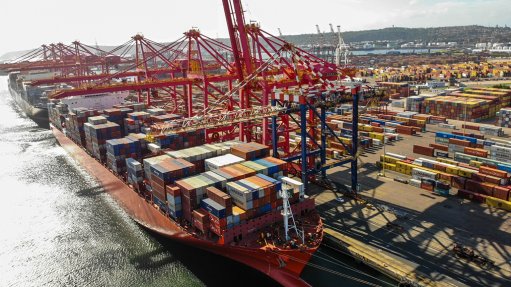
Booyco Electronics, South African pioneer of Proximity Detection Systems, offers safety solutions for underground and surface mining, quarrying,...

Weir Minerals Europe, Middle East and Africa is a global supplier of excellent minerals solutions, including pumps, valves, hydrocyclones,...
sponsored by

Press Office
Announcements
Subscribe to improve your user experience...
Option 1 (equivalent of R125 a month):
Receive a weekly copy of Creamer Media's Engineering News & Mining Weekly magazine (print copy for those in South Africa and e-magazine for those outside of South Africa) Receive daily email newsletters Access to full search results Access archive of magazine back copies Access to Projects in Progress Access to ONE Research Report of your choice in PDF format
Option 2 (equivalent of R375 a month):
All benefits from Option 1 PLUS Access to Creamer Media's Research Channel Africa for ALL Research Reports, in PDF format, on various industrial and mining sectors including Electricity; Water; Energy Transition; Hydrogen; Roads, Rail and Ports; Coal; Gold; Platinum; Battery Metals; etc.
Already a subscriber?
Forgotten your password?
MAGAZINE & ONLINE
R1500 (equivalent of R125 a month)
Receive weekly copy of Creamer Media's Engineering News & Mining Weekly magazine (print copy for those in South Africa and e-magazine for those outside of South Africa)
Access to full search results
Access archive of magazine back copies
Access to Projects in Progress
Access to ONE Research Report of your choice in PDF format
RESEARCH CHANNEL AFRICA
R4500 (equivalent of R375 a month)
All benefits from Option 1
Electricity
Energy Transition
Roads, Rail and Ports
Battery Metals
CORPORATE PACKAGES
Discounted prices based on volume
Receive all benefits from Option 1 or Option 2 delivered to numerous people at your company
Intranet integration access to all in your organisation

Tunisia's Sustained Recovery Requires Quick Action to Take Advantage of Opportunities
TUNIS, May 8, 2024 — Tunisia's economic recovery slowed in 2023, due to a severe drought, tight financing conditions and a modest pace of reform, leaving the country's growth below pre-COVID levels, and making it one of the slowest recoveries in the Middle East and North Africa region, according to the Spring 2024 edition of the World Bank's Economic Monitor for Tunisia.
The report, Renewed Energy to the Economy , forecasts growth rates of 2.4 percent in 2024 and 2.3 percent in 2025-26, assuming easing of drought conditions and some progress in fiscal and pro-competition reforms. The report emphasizes Tunisia’s improved external balance, its narrowing trade deficit supported by favorable international prices, and its external financing needs that remain significant. The report underscores the urgency of addressing the drivers behind the external financing challenges, including energy deficit, debt service, and level of capital inflows.
Despite gains in the tourism and export sectors, Tunisia's economy was affected by the impacts of drought-related losses that led to an 11 percent drop in agriculture, underlining the need for adaptation to climate change. These losses have been compounded by limited domestic demand, penalizing sectors such construction and trade. This has led to a rise in unemployment, which reached 16.4 percent in the fourth quarter of 2023, and a drop in labor force participation.
The report delves into the details of the country’s current economic challenges and opportunities. Despite limited demand, inflation remains at 7.8 percent. In particular, food price inflation stands at 10.2 percent. Most of this inflation can be attributed to rising profits and import prices, underlining the significant impact of competition and trade policies on inflationary pressures. On the positive side the trade deficit fell from 17.5 percent of GDP in 2022 to 10.8 percent in 2023, with the current account deficit also narrowing from 8.6 percent to 2.6 percent of GDP over the same period.
Faced with tighter external financing conditions, Tunisia has increasingly relied on domestic banks — and more recently to the Central Bank - to finance its budget. This shift has heightened financial system vulnerabilities and led to a crowding-out effect, where banks devote an increasing share of lending to the government over the private sector.
"Despite ongoing challenges, there are significant opportunities for Tunisia to transform and strengthen its economy. With strategic investments, particularly in renewable energy, Tunisia could significantly enhance its economic resilience and sustainability,” said Alexandre Arrobbio, the World Bank's Country Manager for Tunisia . “We are committed to helping Tunisia tapping into its rich renewable energy resources, and our report identifies clear pathways to growth and stability. Developing these resources is essential to reducing import dependency and fiscal costs while enhancing energy security and fostering a sustainable economic future."
A major focus of the report is on Tunisia's ambitious plans for renewable energy as a solution to its economic and environmental challenges. The country aims to increase the share of renewables in its electricity mix from the current 3 percent to 35 percent by 2030. At present, 2,200 MW of private generation projects have been launched, which are expected to bring the share of renewables up to 17 percent by 2025. The report highlights the large economic benefits of deepening this transition through an ambitious decarbonization agenda. The total investment required is estimated at US$ 4.5 billion by 2030 and could come mainly from the private sector should adequate regulatory conditions be in place. One of the flagship projects on this agenda is the electricity interconnection between Tunisia and Italy (Elmed). This project aims to improve the resilience of the Tunisia’s electricity system and transform it into a net exporter of electricity. This would significantly reduce the country’s dependence on costly natural gas imports and improve its balance of payments.
This site uses cookies to optimize functionality and give you the best possible experience. If you continue to navigate this website beyond this page, cookies will be placed on your browser. To learn more about cookies, click here .

IMAGES
COMMENTS
Tourism in Zimbabwe holds immense potential to unlock a world of benefits and opportunities for the country and its people. Here are the key potential benefits that tourism can bring to Zimbabwe: Economic growth : Tourism has the power to stimulate the economy by creating jobs, generating revenue, and attracting foreign investment.
1. Victoria Falls and all it's fun activities. For adrenaline seekers, Zimbabwe has endless adventures to offer. In just the town of Victoria Falls alone there's white-water rafting on the Grade 5 rapids of the mighty Zambezi River, bungee jumping, horseback safaris, gorge swinging, zip lining, abseiling and crocodile cage diving. 2. Khami ...
Boosts Economy. Tourism is one of the largest contributors to Zimbabwe's economy. It brings in foreign currency, creates jobs and business opportunities, and helps to promote economic growth. According to the Zimbabwe Tourism Authority, the sector contributed $1.4 billion to the country's GDP in 2018. This makes tourism a significant source ...
In so doing taxi drivers played a positive role in the development of domestic tourism in Zimbabwe. However, not all taxi drivers were contributing positively to domestic tourism with others being accused of overcharging tourists. Some taxi drivers charged for instance $10 for a distance of less than 2 km.
Tourism in Zimbabwe. Zimbabwe boasts several tourist attractions, located in almost every region of the country. Before the economic changes, much of the tourism for these locations came to the Zimbabwean side but now Zambia benefits from the tourism. The Victoria Falls National Park is also a tourist attraction and is one of the eight main ...
Zimbabwe is no different as our travel industry is an important piece of the economic jigsaw puzzle. Here are some of the reasons we should support local tourism. 1. The Tourism industry employs at least 200 000 people in Zimbabwe, 1 this is across various sub-sectors of this industry, Accommodation providers, Leisure activity operators ...
23 Jun 2021. UNWTO commits to work with the Government of Zimbabwe to measure the importance of tourism for the country's economy. Zimbabwe has identified tourism as a central pillar of its National Development Strategy, (NDS 1, 2021-2025). To reflect this, UNWTO is now working with the government on the development of the country's first ...
Ecotourism and Nature-based Tourism: With its abundance of national parks, scenic natural wonders, and commitment to conservation, Zimbabwe appeals to eco-conscious travelers. Sustainable tourism initiatives and eco-lodges allow visitors to experience the country's wildlife and landscapes responsibly. Importance and Benefits of Tourism in ...
Zimbabwe has several national parks and natural attractions such as Hwange National Park, Mana Pools, Gonarezhou National Park, Victoria Falls, Lake Kariba, and the Great Zimbabwe National Monument. Statistics from the Zimbabwe Tourism Authority (ZTA) show that tourist arrivals to Zimbabwe rose by 174 percent in 2022 (from 380,820 tourists in ...
A general overview. Zimbabwe's Tourism Authority (ZTA) figures indicate that the number of visitors arriving in Zimbabwe declined 11% in 2019 from 2.29 million in 2018, attributed to destination photos' political unrest following elections in August 2018 and to the stay-off demonstrations in January 2019. Most tourists have come from Africa ...
Chibaya, T. 2013 From "Zimbabwe Africa's Paradise to Zimbabwe A World of Wonders": Benefits and Challenges of rebranding Zimbabwe as a tourist destination, Developing Country Studies, Vol 3, No. 5.
Based on the characteristics of resources in Zimbabwe, the country can create a series of tourism products. such as, "natura l wonders", "culture quest" and "eco-resort" and organized ...
The World Tourism and Travel Council (WTTC, 2022) predict a decade of strong tourism growth at an average rate of 5.8% per annum between 2022-2032, with significant implications for the ...
The Zimbabwe Tourism Authority is a Parastatal organization formed by an Act of Parliament: The tourism Act Chapter 14:20 of 1996 with a mandate of developing, managing, promoting and marketing Zimbabwe as a tourist destination in both the local and international markets. As a National Tourism Organization (NTO), ZTA is responsible for tourism ...
"According to World Travel and Tourism Council, while the direct contribution of travel and tourism to Zimbabwe's GDP was 3.5 per cent, the total contribution of Travel and Tourism to GDP - including wider effects from investment, the supply chain and induced income impacts - was over eight per cent in 2016 and 2017."
of tourism, including religious, community and event tourism. Zimbabwe's tourism industry has grown over the years, from 80 000 visitors in 1980 to over 2.5 million in 2018 which was a 6.0% increase from the 2 422 930 recorded in 2017 (Zimbabwe Tourism, 2020). Despite the challenges Zimbabwe faces, the Government, in
It noted that success of the Zimbabwe's tourism industry is based on its natural resources, people, history, culture, amenities and superstructure. ... sustainable development, and that it can be effectively harnessed to generate net benefits for the poor (UNWTO, 2002).The potential of tourism as a tool to contribute to economic growth and ...
Tourism in Zimbabwe Guidelines for Development and a Manual for CBTEs development in May 2018 (Ministry of Tourism and Hospitality Industry, report, 2018) to support the development of ... the evaluation and assessment of the benefits of CBTEs in Zimbabwe to gauge the impact of these projects is required. There is limited literature regarding ...
mentioning in Zimbabwe`s tourism terrain is the tourism master-plan that is being crafted by the ministry. Essentially, this is the nucleus around which the tourism policy will be ... economic, environmental and socio-cultural benefits which can contribute to the revitalisation of communities and enhancement of people`s quality of life (Kuvan ...
Tourism contributes 30% of service exports and 10% of the global gross domestic product (GDP). In Africa, tourist arrivals grew by 7% in 2017 from 57.8 million in 2016 to 62.1 million in 2019. In Zimbabwe, tourist arrivals grew by 12% from 2.17 million in 2018 to 2.42 million in 2019 (Zimbabwe Tourism Authority (ZTA), 2017).
Natalie Cowling , Jan 30, 2024. Travel and tourism contributed approximately four percent to Zimbabwe's GDP in 2021. Compared to 2020, the contribution of tourism to the economy of Zimbabwe ...
The findings revealed that practices that result in regulatory compliance and those that can be adopted at a lower cost are most popular in the hospitality sector of Zimbabwe. Three factors were ...
This makes sustainability an important element in agritourism development for it to provide maximum benefits for the people (Attila & Petres, Citation 2017; Woyo & Woyo, Citation 2019) and make a significant ... No statistics were obtained on the economic contribution of agritourism in Zimbabwe Tourism Authority (ZTA) tourism trends and ...
The Ministry of tourism reported that the slow development of the local tourism industry had witnessed a marginal increase of tourist traffic of just 10% from 2014 to 2015 as indicated by Table 1. This indicates that the industry needs to be developed. Table 1. Tourist Arrivals into Zimbabwe: Overview. Source Country.
The ecotourism industry has been the primary factor ensuring the survival of mountain gorillas in Rwanda and Uganda and has played roles in supporting conservation of wild dog, whales, and the African penguin, amongst other species. Six Rivers Africa, a Tanzanian NGO founded by Sir Jim Ratcliffe, is establishing an ecotourism network in the ...
However, tourism in Zimbabwe had picked up following the Covid-19 pandemic, Volz noted. The introduction of a new currency, the Zimbabwe Gold, or ZiG, may help to ameliorate some of the inflation ...
Tunisia's economic recovery slowed in 2023, due to a severe drought, tight financing conditions and a modest pace of reform, leaving the country's growth below pre-COVID levels, and making it one of the slowest recoveries in the Middle East and North Africa region, according to the Spring 2024 edition of the World Bank's Economic Monitor for Tunisia.